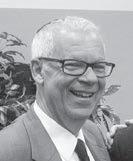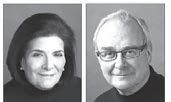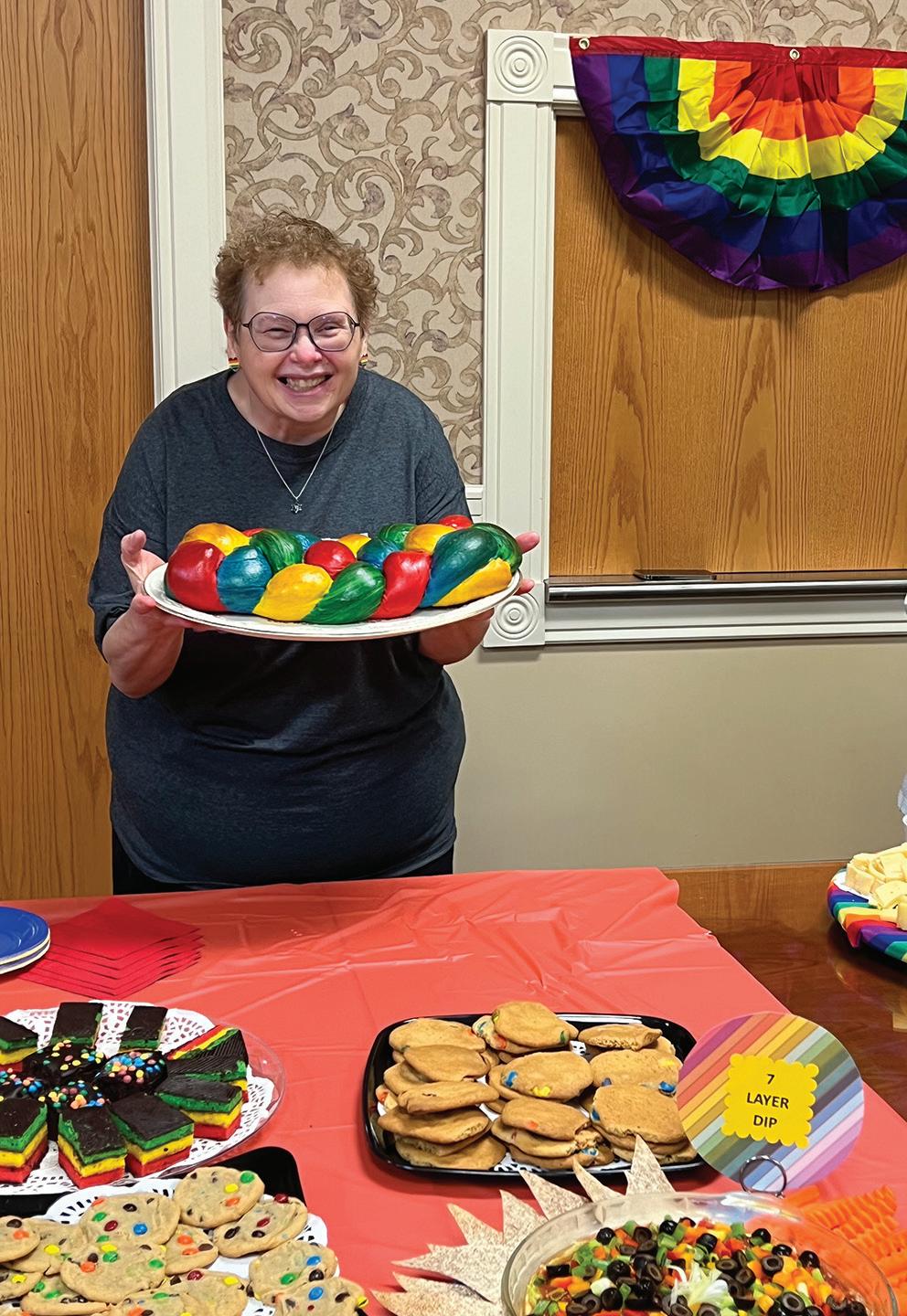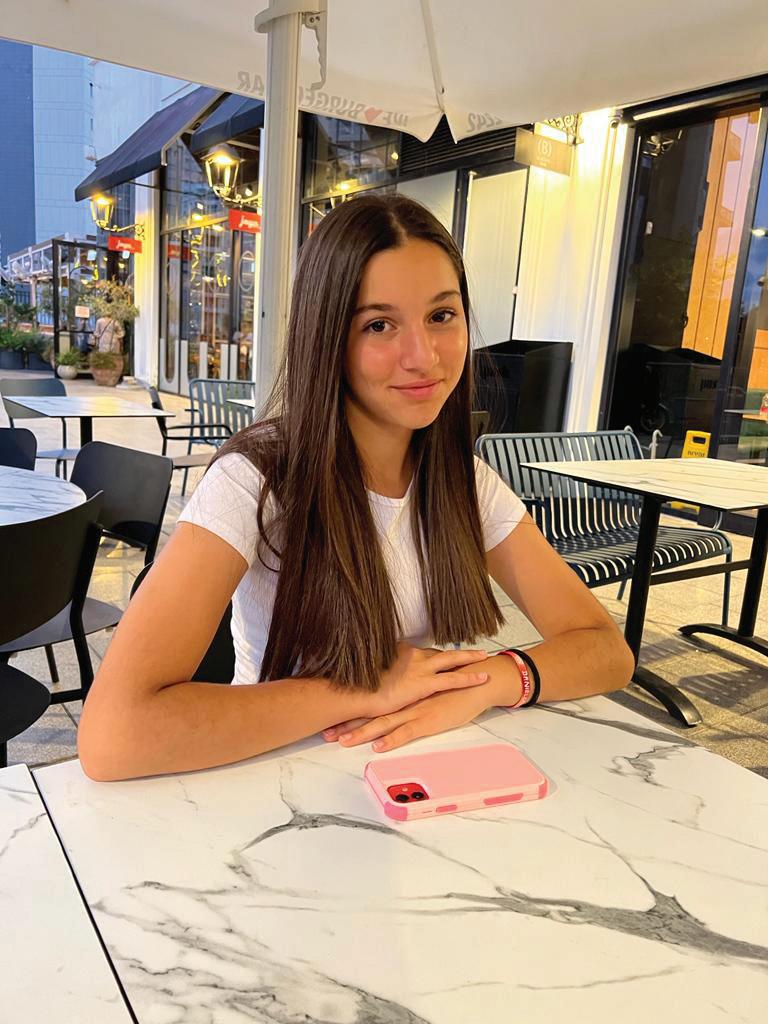Defense focuses on synagogue shooter’s mental health during the trial’s second phase
 By Chronicle Sta and Union Progress Sta
By Chronicle Sta and Union Progress Sta


The trial of the man found guilty of murdering 11 worshippers in the Tree of Life building, and seriously wounding six others, entered the penalty phase on June 26 and continued this week. At issue is whether the shooter will be sentenced to death or spend the rest of his life in prison.
During the second phase of the trial — the eligibility phase — the prosecutors have to first prove the defendant had the requisite intent to commit a capital crime. They also have to convince the jury that at least one of four “aggravating” factors was present: That the shooter tried to kill others in the building; that he planned the crime; that the victims were vulnerable; or that he killed multiple people.
During the eligibility phase, the defense team has focused almost entirely on intent, saying the shooter wasn’t able to form that intent because of brain impairments — including schizophrenia and epilepsy.
To try to prove that, the lawyers have spent several days presenting experts to convince the jury that the defendant suffers
from brain dysfunction.
If the jury decides that he is eligible for death, jurors will move to the final phase of determining his sentence: Life in prison or execution in the federal death chamber in Indiana. That phase will focus largely on victim-impact statements from the prosecution and mitigating evidence about the shooter’s life from the defense.

Here is a recap of the testimony of Days 2-6 of the trial’s second phase. For more extensive and up-to-date coverage, go to pittsburghjewishchronicle.org.


Day 2:

Two neurologists testified that the defendant’s brain showed signs of schizophrenia.
Andrew Newberg, a neurologist at Thomas Jefferson University, testified that areas of the defendant’s brain displayed abnormalities on a PET scan taken in 2021. In particular, the scan showed that the left side of his brain was significantly more active than the right, an imbalance that Newberg says is consistent with a schizophrenia diagnosis.
By Abigail Hakas | Sta Writer

By the time the trial proceedings ended for the day on June 27, a small group of anti-death penalty activists had gathered across the street from the federal courthouse to advocate against a death sentence for the man who murdered 11 people in the Tree of Life building in 2018.


The scene was hectic, with car honks punctuating every few sentences as Donna Coufal, a member of Congregation Dor Hadash, listened to the names of the victims being read aloud: Joyce Fienberg, Richard Gottfried, Rose Mallinger, Jerry Rabinowitz, Cecil Rosenthal, David Rosenthal, Bernice Simon, Sylvan Simon, Daniel Stein, Melvin Wax and Irving Younger.
“My heart goes out to all of the families who have lost family members, loved ones in this killing,” Coufal said. “No matter what the verdict is, no matter whether this ends with the
July 7, 2023 | 18 Tammuz 5783 Candlelighting 8:35 p.m. | Havdalah 9:42 p.m. | Vol. 66, No. 27 | pittsburghjewishchronicle.org $1.50 keep your eye on PittsburghJewishChronicle A garage minyan LOCAL All about beets Meet Paul Klein LOCAL FOOD Please see Protest, page 10 Please see Trial, page 10 NOTEWORTHY LOCAL These Pittsburgh seniors are still tennis tournament Page 2 LOCAL Sixty-plus years of connection and camaraderie Club is for life Page 3 LOCAL A visual tribute to love and strength Artist’s mural honors victims of synagogue shooting Page 7
‘Remember the victims but not with more killing’: Protesters object to death penalty in 10/27 trial
Donna Coufal, a member of Congregation Dor Hadash, speaks during a protest against the death penalty during an event organized by Death Penalty Action and the organization L’chaim! Jews Against the Death Penalty on Tuesday, June 27.
Photo by Alexandra Wimley/Union Progress
A view of the Joseph F. Weis Jr. U.S. Courthouse, downtown
Photo by Alexandra Wimley/Pittsburgh Union Progress
Headlines
These Jewish Pittsburghers are competing in this summer’s National Senior Games
— LOCAL —
By Abigail Hakas | Sta Writer
The National Senior Games Association is holding its 2023 games in Pittsburgh this year, where players ages 50 and older play in 20 sports across the city.
When the national competition last came to Pittsburgh in 2005, Oakland resident David Steinbach competed in singles tennis and golf. Now 83, Steinbach is headed back to the games to compete — and he’s not alone. Bob Katzen, a lifelong friend, is joining him to play doubles tennis.

Steinbach and Katzen met more than 70 years ago and are nearly inseparable. They both attend Temple Sinai in Squirrel Hill, they play golf together at Green Oaks Country Club and their offices even are in the same building.
Steinbach and Katzen have both played tennis and golf for decades. Of the two sports, Katzen’s favorite is tennis, but Steinbach said he doesn’t have a preference.
“Just so I can put a P.S. in there, of all of our contemporaries David is the best golfer and the best tennis player,” Katzen added. “So, it’s hard for him to choose being top banana in both sports. He likes both. So, it’s very easy for me to choose. I like tennis better.”
As for what they like best about tennis, both men emphasized the importance of exercising.
“I like the quickness of the game, and the exercise factor,” Katzen said. “They say golf is an old man’s game. When you play tennis, if you play for an hour and a half, two hours, you’re breathing pretty heavy at the end of it.”
Steinbach and Katzen both play tennis
at least three times a week to prepare for the competition, but they don’t get many opportunities to play doubles together.
“The key thing is knowing how each other plays,” Steinbach said. “We’ve played enough with each other over the years. We understand each other’s game. Should we play more? Probably, but it doesn’t work out that way. He’s a busy man.”
Both men are busy, Katzen said. He works in the insurance business and Steinbach stays active in real estate. Despite their hectic schedules, the two keep their eyes on the prize.
“I was playing baseball last weekend,” Katzen said. “David said ‘I don’t care what you do, win, lose or draw, don’t get hurt because next month is tennis. I don’t want you with one arm or something.’”
Both men have decades of experience playing tennis, but Katzen said that his partner has an analytical mind that helps
him compete against younger players. Going into the competition, Steinbach is calming Katzen’s nerves.
“I’ve never played at his level or at a competitive level,” Katzen said. “All my games are just social until he dragged me into this thing. I’m just a little nervous because I’ve never played in something that actually matters.”
“What’s the worst that could happen?” Steinbach asked.
“We lose,” Katzen replied. “Isn’t it nice to have a partner like that? He doesn’t care if we lose.”
One of the men they play tennis against, Norm Bloom, is competing in the National Senior Games for his fourth time. At 87, Bloom is more active than most. Every morning he does exercises to stretch his body and every afternoon he plays tennis. A heart attack in his 30s encouraged him to reconsider his lifestyle, which included a daily steak and baked potato
for dinner. With the help of his wife, he cut meat and dairy out of his diet.
“I’ll have some ice cream every once in a while. I try to say that doesn’t count. I think I had it twice this past year,” Bloom said. “My kids say to me that Tom Brady copied my diet. That’s why he lasted so long in the NFL.”
While Bloom is careful about his health, he doesn’t always listen to what his doctors advise. His commitment to playing is strong enough that he played while he had pneumonia.
“When I was 50, my doctor said, ‘Hey, you’re playing three times a week. You need to take start taking it easy,’” Bloom said. “And I said, ‘Wait a minute, the heart’s a muscle. I think you want to exercise it,’ so I went to five times a week, and he since has retired and doesn’t play tennis. And when I was 70, again, I was told that playing five times a week is too much. That’s when I went to seven days a week.”
Bloom has played tennis competitively for four decades, and he feels that a match reveals a lot about someone’s character.
“Tennis is really interesting because it’s a microcosm of life,” Bloom said. “I always say you can put somebody on a court for an hour, he and I play, I’ll tell you everything you need to know about that person. What kind of person he is, how honest he is, how determined he is. A person’s whole personality comes out, and I thought that forever and the older I get, the more I see it.”
The 2023 National Senior Games run from July 7-18. Men’s singles tennis for those 85 and older, like Bloom, begins on July 12, while Katzen and Steinbach have their first match on July 13. The full schedule can be found on the NSGA’s website, nsga.com. PJC
5915 Beacon St., 5th Floor Pittsburgh, PA 15217
Main phone number: 412-687-1000
Subscriptions: 412-687-1000, ext. 2
SUBSCRIPTIONS
subscriptions@pittsburghjewishchronicle. org
412-687-1000, ext. 2
TO ADVERTISE
advertising@pittsburghjewishchronicle.org
724-713-8874
EDITORIAL DEPARTMENT
Email: newsdesk@pittsburghjewishchronicle.org
BOARD OF TRUSTEES
Evan H. Stein, Board Chair
Gayle R. Kraut, Secretary
Evan Indianer, Immediate Past Chair
Gail Childs, Dan Droz, Malke Steinfeld
Frank, Seth Glick, Tammy Hepps, Cátia Kossovsky, David Rush, Charles Saul
GENERAL COUNSEL
Stuart R. Kaplan, Esq.
Jim Busis, CEO and Publisher 412-228-4690 jbusis@pittsburghjewishchronicle.org
EDITORIAL
Toby Tabachnick, Editor 412-228-4577 ttabachnick@pittsburghjewishchronicle.org
Andy Gotlieb, Contributing Editor
Abigail Hakas, Staff Writer 412-687-1000 ahakas@pittsburghjewishchronicle.org
Adam Reinherz, Staff Writer 412-687-1000 areinherz@pittsburghjewishchronicle.org
David Rullo, Staff Writer 412-687-1000 drullo@pittsburghjewishchronicle.org
ADVERTISING
Phil Durler, Senior Sales Associate 724-713-8874 pdurler@pittsburghjewishchronicle.org

PRODUCTION
Jeni Mann Tough Production Manager
Carl Weigel Art/Production Coordinator Subscriptions subscriptions@pittsburghjewishchronicle.org
412-687-1000, ext. 2
Published every Friday by the Pittsburgh Jewish Publication and Education Foundation 5915 Beacon St., 5th Floor Pittsburgh, PA 15217
Phone: 412-687-1000
POSTMASTER:
Send address change to PITTSBURGH JEWISH CHRONICLE, 5915 BEACON ST., 5TH FLOOR PITTSBURGH, PA 15217

(PERIODICAL RATE POSTAGE PAID AT PITTSBURGH, PA AND AT ADDITIONAL MAILING OFFICES)
USPS 582-740
Manuscripts, letters, documents and photographs sent to the Pittsburgh Jewish Chronicle become the property of this publication, which is not responsible for the return or loss of such items.
The Pittsburgh Jewish Chronicle does not endorse the goods or services advertised or covered in its pages and makes no representation to the kashrut of food products and services in said advertising or articles. The publisher is not liable for damages if, for any reason whatsoever, he fails to publish an advertisement or for any error in an advertisement. Acceptance of advertisers and of ad copy is subject to the publisher’s approval. The Pittsburgh Jewish Chronicle is not responsible if ads violate applicable laws and the advertiser will indemnify, hold harmless and defend the Pittsburgh Jewish Chronicle from all claims made by governmental agencies and consumers for any reason based on ads appearing in the PittsburghJewish Chronicle

2 JULY 7, 2023 PITTSBURGH JEWISH CHRONICLE PITTSBURGHJEWISHCHRONICLE.ORG
Abigail Hakas can be reached at ahakas@ pittsburghjewishchronicle.org.
Bob Katzen (left) and David Steinbach
Photo by Abigail Hakas
The Marquis Club includes a lifetime membership
By David Rullo | Sta Writer
What was the name of the person who sat next to you in third grade? How about the kid who played guard on your basketball team? And what was his nickname?
For most, those details might be hard to remember. Not so for members of the Marquis Club.
Formed more than six decades ago, club members maintain strong bonds through emails and monthly Zoom calls.

Steven Sablowsky said the Marquis Club was created by members of the Falcons at John Minadeo Elementary School in sixth grade.
The Falcons’ primary purpose was to play sports under the auspices of the Jewish Community Center, then known as IKS, Sablowsky said. It was disbanded when the members moved to the Taylor Allderdice High School in seventh grade. The high school, he explained, combined several different elementary schools.
The Marquis Club, formed in the living room of Dennis “Ruby” Leibovitz, was a social club that was loosely based on sports — basketball, football and softball, to name a few — but also included other activities like dances, plays and even bake sales for various charities. The club eventually grew from 11 or 12 original members to more than two dozen at its peak, said Sablowsky, who was known as “Spud.”
“I had a crew cut and short hair, and they said my head looked like a potato,” he recalled. By the time college started, Sablowsky said, everyone went their separate ways, focusing on careers and families. The men went on to become attorneys, doctors, businessmen, a journalist, and even an adult film star.
“It’s a unique group of characters,” he said. The members of the Marquis reconnected at their 20th high school reunion, and the pandemic helped the group get even closer because the men began meeting once a month on Zoom, a tradition that continues.
Spud credits Howie Gordon with keeping the group together.
“He’s a Berkley kind of guy,” Sablowsky said, tying the former Squirrel Hill resident to his current address.
Gordon — a popular adult film star in the 1970s and 1980s whose stage name was Richard Pacheco — has chronicled his life in two books: “Return to Squirrel Hill: A Memoir” and “Hindsight: True Love and Mischief in the Golden Age of Porn.”
“He has an interesting history,” Sablowsky said of Gordon. “He continues to write excerpts to everybody about stuff. Some of it concerns all of us, some it concerns some of us, sometimes it concerns none of us, but it doesn’t stop him.”
Gordon grew up Orthodox at B’nai Emunah in Greenfield. Like Sablowsky, he was first a member of the Falcons.
In the summers, Gordon said, members of the various clubs all went to camp. Falcon and Marquis club members went to Emma Kaufmann Camp.
Front row: Steve “Spud” Sablowsky, Dennis “Ruby” Leibovitz, Alan “Goose” Perer, Dr. David “Man With No Nickname” Sobel, and Steve “Huey” Ruben. Not pictured: Marc “Chops” Lifsher, Jeff “Turtle” Sacks, Albie “Bianchi” Goldfeder, Steve “Baron” Fisher, Ronnie “Umbrella” Kaufman, Richard “Wayne” Sablowsky, Dr. Richard “Radio” Harris, Howard “Houston” Fineman, Bobby “Tito” Frank, Stanley “Worm” Kaufman, Larry “Rock” Rubin, adviser, Lloyd “Bugsy Scrooge” Segal, Tommy “Scholarship” Shehady, Jimmy “Sleepy” Shiner and Harold “Itch” Harris
“I met a lot of clubmates at summer camp,” he said.
It was at EKC that Robert “Bibsy” Lindner became the club adviser. The Marquis Club even garnered its own nickname because of him, becoming known as “Bibsy’s Boys.”
By high school, Gordon was the class president and had earned a reputation on the football field that led to his nickname: “Animal.”
“I was supposed to sacrifice my body so the quarterback would get a few extra seconds to throw the ball,” he said. “When you’re in a situation like that, you go crazy because no one wants to f--- with a crazy person.”
Despite his on-field ferocity, journalist and Marquis Club member Howard Fineman said Gordon is a compassionate and charismatic figure.
“He’s an amazing guy. He’s one in a billion. He’s brilliant. He’s slightly crazy but in a good way. He’s an exhibitionist. He’s creative. He’s a great guy. I was immediately drawn to him,” Fineman said.
Fineman, who was first published in Pittsburgh’s Jewish Chronicle writing its Teen Scene column, went on to serve as chief political correspondent, senior editor and deputy Washington bureau chief for Newsweek. He also was the global editorial director of the AOL Huffington Post Media Group and has served as an analyst for NBC News.
Fineman first heard about the Marquis Club in the annex of Allderdice, where the seventh and eighth graders were sequestered
from the older students. When his friend Jimmy “Shemp” Rosen became a member, he suggested the club admit Fineman as well.
Of all the sports the club members participated in, Fineman said, basketball was his favorite — although, he noted, he wasn’t a star.
“I was named most improved player,” he remembered. “That’s one of those awards — when they give everyone a trophy today, that was the equivalent back in the day.”
Instead of glory on the field, Fineman was a member of The Classics, an early rock band that played the bar mitzvah circuit and won a battle of the bands the group organized.
Music even inspired his nickname, “Houston.” Fineman, it turns out, did a fairly good Dean Martin impression, often singing the crooner’s hit of the same name.
Fineman said having a common cultural touchstone helped define the club.
“We were all Jewish, let’s not forget that,” he said. “We had a common reference point.”
Cantor Marc “Barney” Dinkin agreed.
“There was a real sense of identification among everybody,” Dinkin said. “We were in a Jewish area and didn’t have to go very far for what we needed.”
Dinkin, who received his nickname for his ability to eat the Barney Burger at the Red Barn in Penn Hills, was one of the original Falcon members.
“We shared a lot of things — values, economics and culture. The JCC was accessible to us. We were close to each
other,” he said.
Those values, which were evidenced when, as youngsters, they sold Hebrew National salamis for charity, continued through their adult lives.
The friends continue to lean on each other. Dinkin said people sometimes come to him for spiritual matters and he, in turn, reaches out to other club members for support — like Dr. Louis Alpern, when he has an issue with his eyes.
Alpern is a retired eye surgeon. He said he has known most of the Marquis Club members since second grade. He’s known by his friends as “Vince.” The name goes back to the job he had when growing up.
“I worked 30 hours a week all the way through high school at a place called Food Fair. It’s gone now. I worked in the deli and produce department. For whatever reason, people felt the guy working in a store’s produce department should be Italian — hence Vince,” he said.
He said the deep connections maintained more than 60 years after they formed is, in part, simply Pittsburgh.
“We’re all also rabid Steeler fans,” Alpern said.
Gordon noted that the bonds were created when they were young.
“We got each other high. That didn’t have to do with drugs, it had to do with friendship and community,” he said. PJC
PITTSBURGHJEWISHCHRONICLE.ORG PITTSBURGH JEWISH CHRONICLE JULY 7, 2023 3
Headlines — LOCAL —
David Rullo can be reached at drullo@ pittsburghjewishchronicle.org.
The Marquis Club, top row (from left): Dr. Robert “Bibsy” Lindner, adviser, Richard “Stichweh” Serbin, Marc “Barney” Dinkin, Marc “Hymie” Gulac, Marc “Stromberg” Steingart. Middle row: David “Weasel” Valinsky, Dr. Lou “Vince” Alpern, Howie “Animal” Gordon, Dr. Ellis “Sille Renva” Avner, Jimmy “Shemp” Rosen, Mel “Emperor” Goldstein.
Photo provided by Howie Gordon
County Councilmember Paul Klein wants to fix almost everything. He knows it will take more than elected officials to do so.
Combating antisemitism isn’t just a Jewish responsibility, he continued: “We need a lot of help.”
By Adam Reinherz | Sta Writer
Paul Klein’s part-time position is a fulltime concern. As a member of the Allegheny County Council, Klein is chair of the Health and Human Services Committee and a part of the Executive Committee, the Sustainability and Green Initiatives Committee and the Government Reform Committee.
The quantity of Klein’s responsibilities is dwarfed only by the number of his priorities. That list, he said, includes environmental health and well-being, criminal justice reform, affordable housing, food insecurity, public transportation, the Shuman Juvenile Detention Center, regulation of singleuse plastic, and responsible economic development and growth in the county.

Heading into last month’s Democratic primary, Klein, 68, called his job description: “Everything Everywhere All at Once.”
The title of the Oscar-winning film “really spoke to me,” he said.
Successfully tackling just one of his priorities would be a major victory for the region.
Resolving them all is “pretty daunting,” Klein continued, “but there are many fronts that we need to be working on at the same time.”
One month before the primary, Klein was called “one of the more progressive voices on council in recent years,” by WESA.
He said he isn’t one for labels as political identifiers.
“I’m a humanist,” said the Democratic primary winner. “I feel like all of our efforts should be toward advancing the dignity and the well-being of people. I think that that has to be front and center.”
On council, there’s often talk about a business agenda or other matter. At the core
of these conversations, though, must be a realization of who’s affected, he continued: “We need to do what we can to make sure that, in all of our efforts, we are attempting to enhance the dignity and well-being of all members of society and the communities we are a part of.”
In recent years that’s meant using council to protect marginalized people. Whether in response to antisemitism or other demonizations, council must act, he said: “This is something that is intolerable, unacceptable, and we need to work together in order to advance change in this arena.”
Klein is a Squirrel Hill resident who celebrated his bar mitzvah and confirmation at Tree of Life Congregation nearly 50 years ago.
“That was my family’s synagogue,” he said.
After recalling the shooting in 2018, Klein credited Pittsburgh’s Jewish community with putting a “tremendous amount of effort into making sure that
our voices are not forgotten, and what played out here is something that should never be forgotten.”
For 4½ years, an incident that occurred hours after the Oct. 27, 2018, massacre has remained at the top of his mind.
That Saturday afternoon, Klein was walking near the corner of Murray and Wilkins avenues. In addition to observing heavily armed officers, he recalled, an elected official approached him and said, “I am so sorry about what happened here today. We are all Jews today.”
Klein said he thanked the person, who wasn’t Jewish, but thought, “What about tomorrow? And the day after that? And the day after that?”
“We as Jews, we live in our skin and we live with this reality all the time,” he said. “I think that more people have to find it within themselves to come to terms with the fact that if we’re to make any progress on this front, we all have to be willing to step up and assume responsibility.”
Working in partnership is one mechanism. Investing in the future is another.
For nearly 35 years, Klein has taught law, ethics and corporate social responsibility — first at Duquesne University, now at the University of Pittsburgh.
“I spend a lot of time in the classroom with people who are much younger than I am,” he said. “I really feel like people are more tuned in, more sensitive, more alert than I can recall them having been in the past.” Today’s students are not only concerned with social equity and ethics, but “the work that they have done has been really credible and well informed.”
Klein isn’t losing hope in the effectiveness of council — a 15-member group whose members meet twice a month and receive neither a salary, funding, office nor staff, but an annual stipend of about $11,000 — and he is keenly optimistic about the future.
“I do feel encouraged that ... the generation that is behind me, maybe a couple of behind me, are going to work toward something better,” he said. “I will probably not live long enough to see whatever that group looks like, the fruits of our efforts, but I think that we have to be prepared to play the long game.”
Whether it’s in Allegheny County or nationwide, creating civic and social change is less about hurrying up and waiting than it is about “continued vigilance and a willingness to take the long view, play the long game and advance the cause,” he continued. “That’s something that we’re all going to have to get on board with, where we’re all going to have to agree.” PJC
Adam Reinherz can be reached at areinherz@pittsburghjewishchronicle.org.
Epilepsy association says synagogue shooter’s lawyers have misrepresented epilepsy
— LOCAL —
By Toby Tabachnick | Editor
The lawyers defending the man convicted of murdering 11 worshippers in the Tree of Life building have presented information related to epilepsy “that is misleading, inaccurate and potentially dangerous,” said leaders of the Epilepsy Association of Western and Central PA. The defendant was found guilty of all 63 federal counts he faced last month. The trial is now in its second phase, which will determine whether he is eligible for the death penalty. The defense aims to prove that the shooter’s mental state rendered him incapable of sufficient intent to kill — citing signs of epilepsy and schizophrenia.
But EAWCP officials say that defense lawyers are perpetuating “negative social stigma associated with epilepsy,” and spreading misinformation that “promotes a misunderstanding that could result in harm to our neighbors, family members and friends who do live with seizures every day.”
Although it is unclear from the conflicting testimony if the defendant has a confirmed diagnosis of epilepsy, the defense attorneys raised it repeatedly last week as a factor purportedly affecting his mental health.
“Our hearts, prayers and first thoughts are always with the victims and families who lost loved ones in the senseless 2018 tragedy at the Tree of Life Synagogue,” said Peggy Beem Jelley, president and CEO of the EAWCP in a prepared statement. “We can’t imagine how difficult this trial is for the victims and the Tree of Life Synagogue community. Sadly,
however, [Robert] Bowers’ defense is creating hurt among epilepsy patients as well and we are compelled to speak out on behalf of those patients.”
The information proffered by the defense could cause the public to misunderstand the nature of epilepsy, according to Dr. James Valeriano, chair of the Department of Neurology at Allegheny Health Network and member of the EAWCP board of directors.
“What we don’t want is for people to think epilepsy patients are violent, that they aren’t capable of making sound decisions or that epilepsy patients can’t be trusted,” he said. “Nothing could be further from the truth — there’s just no evidence of that and no reason to believe that epilepsy or typical treatments for epilepsy would affect a patient in that way.”
About 3.4 million Americans live with epilepsy, according to the Centers for Disease
Control and Prevention, and “as many as 30% of adults living with epilepsy also suffer from a serious mental health condition such as severe depression, schizophrenia, or bipolar disorder.”
Beem Jelley said the EAWCP has been responding to calls from patients and families upset by the information about epilepsy that the defense introduced last week.
“I know that folks are hearing and reading things that sound wrong, or that they know are wrong, especially about things like mental health issues, depression, etc.,” Beem Jelley said. “I invite everyone to get the information and learn more by contacting the EAWCP.” The organization’s website is www.eawcp.org. PJC
Toby Tabachnick can be reached at ttabachnick@pittsburghjewishchronicle.org.
4 JULY 7, 2023 PITTSBURGH JEWISH CHRONICLE PITTSBURGHJEWISHCHRONICLE.ORG Headlines — LOCAL —
Paul Klein Photo via Allegheny County Council
“I feel like all of our e orts should be toward advancing the dignity and the well-being of people.
I think that that has to be front and center.”
–PAUL KLEIN
New Pittsburgh minyan isn’t long for the garage
Headlines — LOCAL —
By David Rullo | Sta Writer
You’ve heard of a garage band — but what about a garage minyan?
A garage band plays a simple and raw form of rock ‘n’ roll, inspired by bands like The Kinks and The Rolling Stones. It’s a back-tobasics sort of thing where fans are interested in the essence of the genre without a lot of added gloss to the music.
And while Judah Cowen wouldn’t necessarily say that garage bands influenced his decision to start a minyan in his garage, it would be fair to say it shares some characteristics with the musical style.
A former president of B’nai Emunah Chabad in Greenfield, Cowen recently moved his family to Squirrel Hill, making a Shabbat walk to Greenfield challenging.

Enter The Minyan, housed in Cowen’s garage — although he doesn’t intend for it to stay there.
Think of it as an independent record label in a world of corporate rock, one where artist development is crucial.
“I wanted to create a space where people could grow and help other people grow,” Cowen said. “I think the community needs that. I think my family needs that.”
And just like a garage band featuring the backbeat of Ringo Starr, the surf guitar of Dick Dale and the type of 8-track, straight-to-tape
production not often heard anymore, Cowen is interested in providing a place for everyone,
Lubavitch and everything in between, Cowen said. The service is Orthodox.
since it’s organized by word-of-mouth and a WhatsApp group.
About 25 to 30 men, 18 women and 40 children typically attend The Minyan, Cowen said. Better still is the enthusiasm shared by the group.
Cowen planned on meeting monthly and seeing how the minyan grew. The last get-together occurred after just three weeks, and people soon began asking when the next one will be held.

The owner of Elegant Edge Catering, Cowen attended a yeshiva as a child and traveled to Israel to complete his rabbinic training before deciding to focus on a career in the food service industry. He studied in Hong Kong, working in several prestigious kitchens.

As a result, you won’t find the caterer “fronting the band” and guiding services. Instead, he said that there is a congregational approach to leading prayers. For now, there is no rabbi or cantor taking the lead, but that could change as the minyan grows.



“Right now, we’re so new,” Cowen said. “There’s a lot of excitement. There’s a lot of potential to do good things.”
Other communities have something similar to The Minyan, he said, noting that groups of like-minded people can get a lot done.
regardless of what denomination they call home.
The Minyan, meeting about once a month, is a place for people of all Jewish backgrounds—Reconstructionist, Reform, Conservative, Modern Orthodox, Hasidic,

“It’s everyone’s place,” he added. “I know when I’m around people that aren’t like me, it helps me grow.”
Despite being in its infancy, the turnout has been better than expected, especially
Cowen doesn’t fear The Minyan burning out like a one-hit wonder, though, despite its relative newness.
PITTSBURGHJEWISHCHRONICLE.ORG PITTSBURGH JEWISH CHRONICLE JULY 7, 2023 5
The Minyan probably won’t stay in Judah Cowen’s garage for long. Photo by Judah Cowen
Please see Minyan, page 11
“It’s everyone’s place. I know when I’m around people that aren’t like me, it helps me grow.”
–JUDAH COWEN
Submit calendar items on the Chronicle’s website, pittsburghjewishchronicle.org. Submissions also will be included in print. Events will run in the print edition beginning one month prior to the date as space allows. The deadline for submissions is Friday, noon.
SUNDAYS, JULY 9 – DEC. 3
Join Chabad of Squirrel Hill for its Men’s Tefillin Club. Enjoy bagels, lox and tefillin on the first Sunday of the month. 8:30 a.m. chabadpgh.com.
SUNDAYS, JULY 9– DEC. 17
Join a lay-led online Parshah study group to discuss the week’s Torah portion. No Hebrew knowledge needed. The goal is to build community while deepening understanding of the text. 8:30 p.m. For more information, visit bethshalompgh.org.
MONDAYS AND WEDNESDAYS, JULY 10 – JULY 12
The Jewish people has given the world a range of extraordinary gifts. Without Jews, these amazing contributions might not exist at all. In the 10-part series, The Gift of the Jews, Rabbi Danny Schi will detail the most significant 10 gifts that Jews have given to civilization and will explain their importance to humanity as a whole. Mondays and Wednesdays, 9:30 a.m. $140. jewishpgh.org/event/ the-gifts-of-the-jews/2023-06-12.
MONDAYS, JULY 10 – DEC. 18
Join Congregation Beth Shalom for a weekly Talmud study. 9:15 a.m. For more information, visit bethshalompgh.org.
Join Women of Temple Sinai for Yoga at Temple Sinai, a relaxing class taught by certified yoga teacher Bre Kernick. All levels welcome. No experience required. Ages 16 and older. 7 p.m. $15 a session. templesinaipgh.org/programs-events.
TUESDAYS, JULY 11 – DEC. 19
Join Temple Sinai for a weekly Talmud class with Rabbi Daniel Fellman. Noon. On site and online. For more information and for the Zoom link, contact Temple Sinai at 412-421-9715.
WEDNESDAY, JULY 12
Join New Light Congregation for Pittsburgh is our Home: Honoring Authors Among Us, featuring local Jewish authors. Stay afterward to chat with the authors and enjoy light refreshments. On July 12, meet with Lee Gutkind to discuss “The Godfather Speaks! How I Breathed New Life into Non-Fiction!” 6:30 p.m. In person and on Zoom. 5915 Beacon St. Registration is required at janetnewlightcongregation.org. newlightcongregation.org/events.
WEDNESDAYS, JULY 12 – DEC. 20
Join AgeWell for an intergenerational family dynamics discussion group. Whether you have family harmony or strife, these discussions are going to be thought-provoking and helpful. Led by intergenerational specialist/presenter and educator Audree Schall. Third Wednesday of each month. Free. 12:30 p.m. South Hills JCC.
WEDNESDAYS, JULY 12– DEC. 27
Bring the parashah alive and make it personally relevant and meaningful with Rabbi Mark Goodman in this weekly Parashah Discussion: Life & Text. 12:15 p.m. For more information, visit bethshalompgh.org/life-text.
Temple Sinai’s Rabbi Daniel Fellman presents a weekly Parshat/Torah portion class on site and online. Call 412-421-9715 for more information and the Zoom link.
Jewish quotas were at the heart of Supreme Court affirmative action ruling
By Ron Kampeas | JTA
WASHINGTON — Harvard’s 20th-century antisemitic Jewish quotas were a key part of the Supreme Court’s decision to gut affirmative action last week as the winning litigant and two conservative justices cited them in the landmark case.
The 6-3 decision, authored by Chief Justice John Roberts, bars universities from using race as an explicit factor in considering admissions, but allows race to be cited by applicants in essays describing their life experiences.
Students for Fair Admissions, the conservative advocacy group that brought the cases against Harvard and the University of North Carolina, claimed that the holistic admissions approach Harvard uses — which includes seeking a “extraordinary and diverse class of undergraduate students by conducting a wide-ranging review of every aspect of each applicant’s background and experience” — had its roots in the 1920s quota system “to discriminate against Jewish applicants.”
In 1922, Harvard’s president, A. Lawrence Lowell, noticed a precipitous rise in the number
of Jews accepted to the university and proposed accepting a quota of only 15% Jewish students. Other American and Canadian universities followed suit.
At least two justices were sympathetic to the SFFA argument. Neil Gorsuch and Clarence Thomas each raised the Jewish quotas in separate concurrences.
“According to then-[Harvard] President Abbott Lawrence Lowell, excluding Jews from Harvard would help maintain admissions opportunities for Gentiles and perpetuate the purity of the Brahmin race,” Thomas wrote. Gorsuch quoted the advocacy group’s findings in his concurrence. “Harvard made this move, SFFA asserts, because President A. Lawrence Lowell and other university leaders had become ‘alarmed by the growing number of Jewish students who were testing in,’ and they sought some way to cap the number of Jewish students without ‘stat[ing] frankly’ that they were ‘directly excluding all [Jews] beyond a certain percentage.’”
Gorsuch also brought up Jews in a different context, to ridicule what he said was the incoherence of affirmative action. “There are also decisions granting Hispanic status to a Sephardic Jew whose ancestors fled Spain
Please see Quotas, page 11
THURSDAY, JULY 13
Women are invited to join Chabad of Squirrel for Loaves of Love and bake Star of David challahs. 7 p.m. $12. 1700 Beechwood Blvd. chabadpgh.com.
MONDAY, JULY 17
Making Mighty Muses is a novel way to relax, recharge and renew your spirit. In this workshop inspired by the Nine Muses of Greek Mythology you will create your own personal muses to foster your creativity and spark. Workshop facilitator Emily Harris o ers story-based programs filled with imagination, improvisation and play. Free. 5:30 p.m. 10.27 Healing Partnership, Squirrel Hill JCC, Room 316. 1027healingpartnership.org/ event/mighty-muses-makeshop.
MONDAYS AND WEDNESDAYS, JULY 17 – AUG. 2
There has never been an age in Jewish history without internal Jewish controversies. In the sixpart series Contemporary Jewish Controversies, Rabbi Danny Schi will lead robust discussions about significant Jewish controversies that echo across the contemporary Jewish landscape, including Zoom prayer, intermarried rabbis, the death penalty for acts of terror against Israelis and much more. $85. Mondays and Wednesdays. 9:30 a.m. jewishpgh.org/event/contemporaryjewish-controversies/2023-07-17.
WEDNESDAY, JULY 19
Young children and their grownups are invited to join Rodef Shalom Librarian Sam Siskind for a story in the Biblical Botanical Garden followed by a crafty activity. Free. 1 p.m. 4905 Fifth Ave. rodefshalom.org/garden.
TUESDAY, JULY 25
Women are invited to explore the teachings of
Tanya in a monthly women’s growth group Chabad of Squirrel Hill, 7 p.m. chabadpgh.com
FRIDAY, JULY 28
Eberle Studios presents two films by Sheila Chamovitz In “Skokie: Rights or Wrong,” Sheila examines free speech via the controversial events of the ACLU defending a Nazi march in a Jewish neighborhood. “Murray Avenue: A Community in Transition” is an elegy for the changing culture of the Squirrel Hill neighborhood, told through a look inside now-vanished Jewish-owned business. These moving films will both be presented on 16mm, and Chamovitz will discuss her work following their screening. 7:30 p.m. Free. 229 E. 9th Ave. pghsoundandimage.com.
SUNDAY, JULY 30
Rendezvous in Rodef Shalom’s Biblical Botanical Garden for a free live jazz performance from the Craig Davis Quartet with drinks and hors d’oeuvres. 7 p.m. 4905 Fifth Ave. rodefshalom.org/garden.
SUNDAY, AUG. 6
Rendezvous in Rodef Shalom’s garden for a free live performance with The Boilermaker Jazz Band Join for drinks and hors d’oeuvres, as they bring the swinging sounds of the jazz age back to life. 6 p.m. Free. 4905 Fifth Ave. rodefshalom.org/garden.
WEDNESDAY, AUGUST 9
Join members of the community for the annual Jewish Heritage Night as the Pittsburgh Pirates battle the Atlanta Braves. This year, an optional pre-game meal is available in the Picnic Park from 5:30-7 p.m. from Elegant Edge Catering. Each game ticket purchased will also include a limited edition Pittsburgh Pirates Hebrew T-shirt. 7:05 p.m. $16-44. PNC Park. jewishpgh.org/event/jewishheritage-night. PJC
Join the Chronicle Book Club!
The Pittsburgh Jewish Chronicle invites you to join the Chronicle Book Club for its July 16 discussion of “Call It Sleep” by Henry Roth. From the Jewish Book Council: “When Hen ry Roth published his debut novel ‘Call It Sleep’ in 1934, it was greeted with considerable crit i cal acclaim though, in those troubled times, lackluster sales. Only with its paperback publi cation thir ty years lat er did this novel receive the recognition it deserves and still enjoys. Hav ing sold-to-date millions of copies worldwide, ‘Call It Sleep’ is the magnificent story of David Schearl, the ‘dangerously imaginative’ child coming of age in the slums of New York.

“First published in 1934, and immediately hailed as a master piece, this is a novel of Jewish life full of the pain and honesty of family relationships. It holds the distinction of being the first paper back ever to receive a frontpage review in The New York Times Book Review, and it became a nationwide bestseller.”
Your Hosts:
Toby Tabachnick, editor of the Chronicle David Rullo, Chronicle staff writer
How and When:
We will meet on Zoom on Sunday,
July 16, at noon.
What To Do
Buy: “Call it Sleep.” It is available from online retailers including Barnes & Noble and Amazon and through the Carnegie Library system.
Email: Contact us at drullo@ pittsburghjewishchronicle.org, and write “Chronicle Book Club” in the subject line. We will send you a Zoom link for the discussion meeting.
Happy reading! PJC
Toby Tabachnick
6 JULY 7, 2023 PITTSBURGH JEWISH CHRONICLE PITTSBURGHJEWISHCHRONICLE.ORG Calendar
www.pittsburghjewishchronicle.org
— NATIONAL —
Allegheny Health Network, Israel Innovation Authority announce technology startup collaboration
rules for engagement.
By David Rullo | Sta Writer
Allegheny Health Network is reaching across the pond for a new partnership.
The health care giant headquartered in Pittsburgh has signed a memorandum of understanding with the Israel Innovation Authority, creating a formal affiliation between AHN’s Research Institute and the Innovation Authority to support Israeli health care startups.
The agreement will provide the IIA with access to AHN facilities for pilot projects, advanced technological support and other forms of program assistance.
Dr. Jeffrey Cohen, chief physician executive for innovation at AHN, said that the partnership was brought to him by the 412x972 group. Supported by the Jewish Federation of Greater Pittsburgh and assisted by the Allegheny Conference on Community Development, 412x972 takes its name from the area codes of Pittsburgh and Israel. Its mission is to facilitate relationships between businesses in Pittsburgh and the Jewish state.
“We started looking at it from the standpoint that anything that brings innovation into AHN
and Highmark is a good thing because it stimulates thought and change,” Cohen said. Israel, he noted, has a lot of innovation but it’s a relatively small country with a population of about 10 million people. Pennsylvania, by comparison, has nearly 13 million residents.
“The innovation that goes on there has to leave Israel to be successful,” Cohen said. “Every country in the world wants to come to the United States.”
The agreement, he said, gives AHN a first look at companies created by the IIA in the health care space. The IIA, in turn, gets access to the American market with the intellectual property staying in Israel.
Any deals, Cohen said, will be between the health care network and the individual companies. The IIA simply lays out the
AHN and Highmark Health Insurance, Cohen said, is the second largest integrated health system in the United States, serving 6 million people and spanning four states.

“There are a lot of problems to solve. If you bring in something that helps us in this domain, you get immediate traction with a very large insurer and this keiretsu (a Japanese term meaning a business network) of Blues around the country, where everybody talks to everybody,” he said.
Included in the advantages of working with AHN is Pittsburgh’s infrastructure, Cohen noted, which includes the colleges and universities and the city’s workforce. Pittsburgh’s not only strong in health care, but in computer science — specifically artificial intelligence and advanced manufacturing in robotics, which, Cohen said, the IIA is trying to promote within Israel.
When the collaboration is finalized later this year, applications to the new program will be opened in Israel with the IIA and AHN jointly selecting, screening and approving finalists. The selected companies will then receive up to 50% funding from the IIA to conduct joint research and development projects or pilots with AHN.
Cohen expects to begin seeing fruits from the partnership in the next six to 12 months.
The relationship, he said, is one more piece in the changing health care landscape.
“Innovation is very important to that,” he said. “My job is to bring ideas and look at marrying product development cycles to ideas. So, where are we going? What do we need? What are the problems we have?”
The payoff for Israel is economic development, he said, adding that in the context of 360 million Americans, the GDP for health care in the United States is approximately seven times larger than the Israeli GDP.
“That’s just health care. Our model is going through changes right now. All the stresses on the system are producing different avenues [of opportunity.] They’re producing products that are going to, in many cases, simplify, improve and deliver care faster, in a different fashion, in a more digital fashion. But it’s a relatively small market and they’re looking to export this technology for obvious reasons,” Cohen explained.
The IIA has a budget of approximately $200 million and the partnership in Pittsburgh, he said, is “a very big story.” PJC
David Rullo can be reached at drullo@ pittsburghjewishchronicle.org.
Pittsburgh artist Kyle Holbrook unveils synagogue shooting memorial mural in Squirrel Hill
By Abigail Hakas | Sta Writer
Not far from the Tree of Life building is artist and anti-gun violence advocate Kyle Holbrook’s latest mural, a memorial to the 11 victims of the 2018 shooting — Joyce Fienberg, Richard Gottfried, Rose Mallinger, Jerry Rabinowitz, David Rosenthal, Cecil Rosenthal, Bernice Simon, Sylvan Simon, Dan Stein, Irving Younger and Melvin Wax — as well as all victims of gun violence.
The mural depicts the Tree of Life building lined with hearts and Stars of David. Holbrook wanted to echo the memorials erected immediately following the shooting. A chain of people holding hands stretches across the mural, emphasizing that the shooting did not kill the love and strength in the community, Holbrook said.
“The Tree of Life is still living, and that’s why I wanted the tree on the right side,” he said. “On the right side, they see it turning back to life with the tree reforming and the life still being there.”
The mural is purple, a color commonly used in memorials, because Holbrook did not want bright and cheerful tones to undercut the message of the work. A bright orange stop sign is the only exception, symbolic of the need to end gun violence. Next to it is a hand forming a peace sign with a QR code linking to Tree of Life, Inc.’s Remember. Rebuild. Renew campaign.
Holbrook has an extensive career as a muralist in Pittsburgh and across the country. He’s created murals in every state but Alaska andis
responsible for many local murals through his Moving the Lives of Kids Community Mural Project, which encourages young artists to paint murals.
Holbrook spent two days painting the mural at 5819 Phillips Ave. before it was unveiled on June 28 during National Gun Violence Awareness Month. The mural was painted on the back wall of the Coriander India Grill and faces the parking lot.
While he lives in Miami now, Holbrook is a homegrown Pittsburgh artist from Wilkinsburg. His parents, both teachers, encouraged his love of art. He painted nude models to learn anatomy when he was 7 and took weekend classes at the Carnegie Museum of Art.
“I always went to the Carnegie Museum’s Saturday classes. You know, ever since elementary school, every Saturday,” he said. “Even when I got in trouble later in high school. My dad had cancer. He died in my arms when I was 18. But I always went to my Saturday art classes and never missed those even when I missed regular school.”
He’s created several murals in Squirrel Hill with community members, including one of Gandhi near the synagogue shooting mural. His murals often focus on the desire for peace and the end to gun violence.
And for Holbrook, it goes beyond the hypothetical. Now 45, Holbrook has lost dozens of friends to gun violence.
“I mean, the guns were so readily available, you know, in Wilkinsburg growing up,” he said. “I’ve been shot at. I’ve had that experience of selling guns. It’s so embarrassing. But also, so many of my friends were killed.”
A signature element of his work, the hand forming the peace sign rising from the ground, represents those lost to gun violence.
“I mean, a lot of times I’m channeling my friends, a lot of times. That’s why I started doing the hand coming from the ground, almost like the voice for victims,” he said.
Holbrook emphasized that, unlike many of his anti-gun violence murals, the synagogue shooting mural is also about antisemitism.

“I think it was my duty as an artist to use the
public nature of murals to draw attention to this, especially since the trial is going on at this time in our city,” he said. “Every mural is different and a lot of the other murals that I do that are just about, I don’t want to say just about gun violence, but the Tree of Life was also about antisemitism.”
His connection to the Jewish and Squirrel Hill communities inspired him to create the mural.
“I went to the [Squirrel Hill Jewish Community Center] and played in the JCC league as a kid, basketball and baseball,” he said. “I went to several bat mitzvahs and bar mitzvahs as a middle schooler. I have a great relationship with the community in Squirrel Hill. … and so the antisemitic part really touched me as well.”
Holbrook chose to paint the mural in the parking lot because he wanted to give people a private but accessible space in Squirrel Hill to mourn the deaths and cherish the moments spent with lost loved ones.

“I wanted it to be quiet but also right in the middle of everything,” he said. “Some of my really great and close friends, and a lot of my memories, are friends that have been victims of gun violence. So, there’s a lot to think about. I like to think about the good times and the good things, and good memories, so they’re not forgotten.” PJC
Abigail Hakas can be reached at ahakas@ pittsburghjewishchronicle.org.
This story is part of ongoing coverage of the Pittsburgh synagogue shooting trial by the Pittsburgh Jewish Chronicle and the Pittsburgh Union Progress in a collaboration supported by funding from the Pittsburgh Media Partnership.
PITTSBURGHJEWISHCHRONICLE.ORG PITTSBURGH JEWISH CHRONICLE JULY 7, 2023 7 Headlines — LOCAL —
— LOCAL —
Mural in memory of the victims of the Pittsburgh synagogue shooting Photos by Abigail Hakas
Sign outside Allegheny General Hospital
Photo courtesy of Allegheny Health Network
Progressive Democrats seek to stall Israel’s entry into a coveted visa waiver program
By Ron Kampeas | JTA
WASHINGTON — Nineteen progressive Democrats in Congress — including Summer Lee, who represents Squirrel Hill — urged the departments of State and Homeland Security to keep Israel from joining a coveted program that would enable its citizens to travel to the United States without a visa, saying Israel profiles Muslim, Arab and particularly Palestinian Americans.
The letter sent last week to Secretary of State Antony Blinken and Homeland Security Secretary Alejandro Mayorkas is the latest salvo in Congress over Israel’s long-standing hopes of getting into the visa waiver program. Last month, 65 U.S. senators urged Israel’s rapid entry into the program, while in May, 14 U.S. Senators urged that Israel enter only if it complies with all of the program’s provisions.
Currently, Israelis who do not hold citizenship in any of the 40 countries in the waiver program must apply for permission to travel to the United States, a process that typically results in a visa but can be extensive.
“Arab Americans, particularly Palestinian Americans, and those that have advocated on behalf of the Palestinian people routinely face discrimination, harassment, and denial when traveling to and from Israel and the” West Bank, the letter, spearheaded by Rep. Jonathan Jackson, the son of civil rights leader Jesse Jackson, says.

The waiver program, which currently has 40 participating countries, bans profiling based on ethnicity, religion or national origin.
“Americans citizens are frequently detained and questioned for hours, subjected to invasive searches of their personal electronic devices, and arbitrarily denied entry,” the letter says.
“This same harassment often occurs as these same American citizens are departing from Israel on their return to the U.S.”
Two of the letter’s signatories, Rashida Tlaib of Michigan and Ilhan Omar of Minnesota, are cited in the letter as examples of Muslim Americans who have been denied entry because of their background. Tlaib is Palestinian American; Omar is a Somali American.
“Both Representative Rashida Tlaib and
Representative Ilhan Omar have previously been barred by Israel from entering for a planned visit to Israel and the Occupied Palestinian Territories,” the letter said. “The extraordinary decision by Israel to prevent democratically elected representatives from entering the country makes plain Israel’s enforcement of discrimination against political views at the border and rejection of the democratic value of freedom of speech.”
Tlaib in 2019 sought to lead a group of lawmakers on a tour of Israel and the West Bank to counter a similar biennial tour organized by an affiliate of the American Israel Public Affairs Committee. Israel’s government, under pressure from then-President Donald Trump, denied them entry. That sparked a backlash
France gets its first Orthodox woman rabbi
life as well,” she told the Jewish Telegraphic Agency on the phone the day before her ordination on June 15.
By Alice d’Oléon | JTA
PARIS — After graduating from an American rabbinical program this month, a French woman has likely become her country’s first Orthodox female rabbi.
Myriam Ackermann-Sommer, 26, has since last year been running Ayeka, one of Paris’ only Modern Orthodox congregations, with her husband Emile Ackermann. He also earned a rabbinical degree this month from Yeshivat Chovevei Torah, a liberal Orthodox seminary in New York City.

Ackermann-Sommer graduated from its partner school for women, Yeshivat Maharat, which has an equivalent curriculum and ordains its students as clergy, some of whom take on the title “rabbi” or a variation on that word. Both schools were founded by Avi Weiss, a rabbi long known for advocating for women in Orthodox spaces.
Now, with their degrees, they are qualified to adjudicate matters of Jewish law for their congregants, something AckermannSommer calls a “tremendous responsibility.”
“Jewish girls in France grow up surrounded by women who excel in all areas of civilian life. They are lawyers, doctors, teachers… but all of our rabbis are long-bearded men! We need women to be involved in Jewish
Orthodoxy, which traditionally prohibits women from leading prayer services or becoming rabbis, has long been the predominant Jewish denomination in France, which is home to close to 450,000 Jews, or one of the world’s largest Jewish populations. Some liberal segments of Modern Orthodoxy, a subset of the denomination that strives to adapt traditional Jewish observance to contemporary life, have ordained women as rabbis and permitted them to lead some parts of services. But that approach is more widespread in countries such as the United States and Israel.
“This is a historic moment in the history of French Judaism,” said Michaël de Saint-Chéron. The French philosopher and expert on religion recently co-wrote a book about what it’s like to convert to Judaism or “come back” to the Jewish fold later in life with Ackermann-Sommer that will be published in October. “They are an example for many. Other women have already followed in Ackermann-Sommer’s footsteps and started studying to be rabbis themselves.”
There are only believed to be five other women rabbis in France, all under the liberal umbrella — similar to the Reform movement in the United States. Delphine Horvilleur, who has made headlines for actively promoting women’s voices in Judaism in recent years, is among the most well-known.
Ayeka regularly draws 50 people for Shabbat services, and women are separated from men, per Orthodox practice, by a divider that seats them side by side. The congregation holds prayers according to the standards of what is known as a “partnership minyan” — a model that is followed in a number of liberal Orthodox congregations, largely in the United States and Israel, in which women can chant weekly Torah readings and lead certain portions of services.
“Some are perfectly all right with how
from Jewish groups, including AIPAC, who said it was untoward for Israel to ban entry to elected officials.
A number of Biden administration officials, chief among them Tom Nides, the soonto-depart ambassador to Israel, have been lobbying intensely for Israel’s entry into the waiver program and have proposed a compromise whereby Israel would ease some of its restrictions.
That’s not enough for Arab American groups, and Jackson unveiled the letter last week in a Zoom meeting convened by the Arab American Institute.
“We do believe in measuring human rights by one yardstick,” Jackson told the call. “That’s a core principle that we have, as it relates to the visa waiver program. All American citizens have to be treated equally and fairly. That’s non- negotiable.”
Other signatories include Jan Schakowsky of Illinois, who is Jewish, and who is chief deputy whip of the Democrats in the House; and Pramila Jayapal of Washington, a senior whip and the chair of the Congressional Progressive Caucus.
A number of centrist and right-wing pro-Israel groups, led by AIPAC, are pressing for Israel’s accelerated entry into the waiver program, and for the swift resolution of whatever compliance issues remain. Liberal Jewish Middle East policy groups like J Street and Americans for Peace Now also back entry into the program, but only if Israel fully complies with its provisions. PJC
Orthodox communities work and that’s great for them. I, as a woman, am outraged whenever I’m at the synagogue and I cannot hear or see what is going on because I’m seated far away in the back behind the men or on a balcony where I can’t hear very well,” Ackermann-Sommer said. “We offer a response to women, among others, who want more participation in the ritual and in the study.”
Some in France have criticized the couple’s philosophy. Others believe the whole concept
Please see France, page 11
8 JULY 7, 2023 PITTSBURGH JEWISH CHRONICLE PITTSBURGHJEWISHCHRONICLE.ORG Headlines
—
— NATIONAL — — WORLD
Jesse Jackson’s son, Jonathan Jackson, attends an international conference “Is #Auschwitz only Sleeping?” during the celebration of European Roma Holocaust Memorial Day in Krakow, Poland, on July 5, 2019.
Photo by Beata Zawrzel/NurPhoto Emile Ackermann and Myriam Ackermann-Sommer are leading what is thought to be one of the only Modern Orthodox congregations in France.
Photo by David Khabinsky
Two women sedated and in serious condition after Tel Aviv terror attack
Six people remained hospitalized Wednesday the day after a terror attack in Tel Aviv, including two women who were in serious condition, according to The Times of Israel. One of the women was pregnant and lost her child due to injuries she sustained in the attack.
The hospital said two others who were lightly wounded were being treated in its neurosurgery and orthopedics departments. Two victims of the attack remained at Beilinson Hospital in Petah Tikva, which reported their conditions had improved and were no longer life-threatening.
According to police, the Palestinian assailant rammed his pickup truck into people on a sidewalk on Tel Aviv’s northern Pinchas Rosen Street, then got out and stabbed others. He was shot dead by an armed civilian.
Shin Bet named the terrorist as Abed al-Wahab Khalaila, 20, from the West Bank town of as-Samu, in the South Hebron Hills area. The security agency said he did not have an entry permit to Israel.
Israeli soldier killed as Jenin operation ends
An Israeli soldier was killed in Jenin on Tuesday evening as IDF forces withdrew from the city following an intensive two-day
counterterrorism operation, JNS reported.
According to the military, Chief Sgt. David Yehuda Yitzchak, 23, a non-commissioned officer from the Egoz commando unit, was treated for a gunshot wound at the scene before being evacuated to hospital, where he was declared dead. The IDF is investigating the possibility that he was hit by friendly fire.
The military launched the major counterterror operation in Jenin in the early hours of Monday, including the entry of significant ground forces. Over 1,000 IDF troops participated in the campaign, which is believed to be the largest deployment in Judea and Samaria in two decades. The military said on Tuesday its forces had killed at least 12 Palestinians, all of them terrorists.
Israeli troops arrested well over 100 terror suspects.
Italy to bar soccer players from wearing No. 88, which has coded meaning for
neo-Nazis
Soccer players in Italy will no longer be permitted to wear the number 88, which has a secret antisemitic meaning among neo-Nazis, thanks to a joint initiative announced on June 27 between Italy’s government and the Italian soccer federation, JTA.org reported.
The number 88 has been used by neo-Nazis as a coded antisemitic symbol meaning “Heil Hitler,” as “h” is the eighth letter in the alphabet. In March, a fan of the Roman club S.S. Lazio was banned from the team’s games for life after wearing a jersey with the number 88 and the name “Hitlerson.”
Today in Israeli History
July 10, 1957 — Yiddish writer Sholem Asch dies
As part of the new policy, officials may stop gameplay if they hear antisemitic chants or are made aware of antisemitic acts in the stands. Such behavior is somewhat commonplace at soccer stadiums across Europe, and other teams and leagues in Germany and England have recently taken steps to stem antisemitism and protect Jewish fans.
The new initiative includes a code of ethics in accordance with the International Holocaust Remembrance Alliance, the global coalition based in Sweden that works to advance Holocaust awareness and education.
According to Sports Illustrated, two players in Italy’s top league, Serie A, wear No. 88: Lazio’s Toma Bašić and Atlanta’s Mario Pašalić.

Violent antisemitism on the rise in Germany, watchdog finds
Violent antisemitism is on the rise in Germany, according to a report released on June 28 by a Berlin-based watchdog organization with branches around the country, JTA.org reported.
According to the report on “Antisemitic Incidents in Germany 2022” from the Federal Association of Research and Information Centers on Antisemitism, while the overall number of incidents dropped slightly from the previous year, nine incidents were categorized as “extremely violent,” up from six in the previous year. It was the highest total on record since 2017 when the annual reporting began.

The total number of antisemitic incidents
RIAS recorded was almost 11% lower than in 2021, which had a total of 2,773, but 26% higher than in 2020, when the total was 1,957.
The extremely violent incidents included shots fired in November 2022 at the entrance of the historical rabbi’s house at the Old Synagogue in Essen. The category includes physical attacks as well as attempted attacks. In all, 65 antisemitic assaults were counted in 2022, down from 70 in the previous year.
Jewish player Amari Bailey drafted 41st overall by Charlotte Hornets
The NBA’s Jewish roster added a new name on June 22, as Amari Bailey, a guard from the University of California Los Angeles, was drafted 41st overall by the Charlotte Hornets, JTA.org reported.
Bailey, 19, a former five-star recruit who played at the prestigious prep school Sierra Canyon High School, personally identifies as Jewish, his agent Bernie Lee confirmed to the Forward.
Bailey’s Jewish heritage comes from his mother, an influencer who goes by Johanna Leia (real surname Edelberg) and who had a widely publicized fling with Jewish rapper Drake in 2021. Bailey’s father is former NFL wide receiver Aaron Bailey.
Bailey joins Washington Wizards forward Deni Avdija, the highest-drafted Israeli player in the NBA, and Sacramento Kings forward Domantas Sabonis, whose wife announced earlier this year that he was converting to Judaism. PJC
— Compiled by Andy Gotlieb
Items are provided by the Center for Israel Education (israeled.org), where you can find more details.
July 7, 1969 — U Thant: ‘open warfare’ along canal U.N. Secretary-General U Thant says he is considering withdrawing U.N. observers from the Suez Canal zone because of “open warfare” as Egypt and Israel shoot across the canal daily.
July 8, 1989 — Judo Champ
Yarden Gerbi is born
Yarden Gerbi is born in Kfar Saba. Gerbi wins eight national judo championships and rises to the top of the world rankings. In 2013, she becomes the first Israeli to win a world judo title. In 2016, she wins an Olympic bronze.

July 9, 1967 — Bernstein concert celebrates war victory
Leonard Bernstein conducts the Israel Philharmonic Orchestra on Mount Scopus to celebrate the cultural unification of Jerusalem after the June 1967 war. The concert features Mahler’s “Second Symphony.”
Yiddish novelist and playwright Sholem Asch dies at 76 in London. He first visited Palestine in 1908 and wrote about the Jewish connection to the land. He lived his last two years in Bat Yam.
July 11, 1920 — WIZO is founded in London
Rebecca Sieff, Vera Weizmann and Edith Eder found the Women’s International Zionist Organization in London. WIZO aims to provide child care, housing, schooling and other services in Palestine.
July 12, 2006 — Second Lebanon War begins
Hezbollah starts the Second Lebanon War by launching rockets and mortars and ambushing an Israeli patrol across the border, killing three soldiers and abducting two others. The fighting lasts until Aug. 14.
July 13, 1978 — Peace deal is urgent, Sadat says Egyptian President Anwar Sadat invites Israeli Foreign Minister Ezer Weizman to a meeting in Austria to press for a bilateral peace agreement. Sadat says Israel must withdraw from Sinai, Gaza and the West Bank. PJC

PITTSBURGHJEWISHCHRONICLE.ORG PITTSBURGH JEWISH CHRONICLE JULY 7, 2023 9
WORLD —
Headlines —
We Prepare Trays for All Occasions HOMEMADE SALADS & SOUPS CATERING SPECIALISTS DELI PARTY TRAYS DELICIOUS FRIED CHICKEN UNDER THE SUPERVISION OF VAAD OF PITTSBURGH WE RESERVE THE RIGHT TO LIMIT QUANTITIES. HAOLAM SL MOZZARELLA $3.99 6 OZ GEFEN EGG NOODLES $2.99 EA DESERT VALLEY MEDJOOL DATES $6.99 EA GOLD'S BORSCHT ALL VARIETIES $2.99 EA HUMMUS $6.99 LB BRISKET $24.99 LB ORANGE STUFFED OLIVES $6.89 LB SHOR HABOR SALAMI $10.99 EA WINE SPECIALS HOURS KEDEM 144 BLANC OR ROUGE $6.99 750 ML BARTENURA PEACH OR LYCHEE MOSCATO $14.69 4 PK CANS GROCERY DELI COOKED FOODS SEAFOOD SALAD $12.79 LB ROAST CHICKEN LEGS $7.99 LB SHERRY MUSHROOM BONELESS BREAST $13.49 LB LEMON NOODLE KUGEL $5.29 LB MONDAY & TUESDAY DINNER SPECIAL Beef Stew Buttered Noodles $25.99 Serves 2 MEAT BONELESS BREAST $7 69 LB CHUCK STEAK $10 99 LB CHUCK ROAST $10 89 LB STORE HOURS Sunday • 8 a.m. - 6 p.m. Monday • 8 a.m. - 6 p.m. Tuesday • 8 a.m. - 6 p.m. Wednesday • 8 a.m. - 6 p.m. Thursday • 8 a.m. - 8 p.m. Friday • 8 a.m. - 3 p.m.
Anwar Sadat (left) and Ezer Weizman, who had a crucial meeting about peace in July 1978, embrace in Haifa in April 1979.
— WORLD —
Yarden Gerbi is Israel’s first judo world champion and won one of a halfdozen Israeli Olympic medals in the sport.
Headlines
Trial:
Continued from page 1
However, Newberg said, a PET scan alone is not enough to secure a diagnosis. Clinical examination and other types of scans are necessary.
In addition to the asymmetry, Newberg testified that the defendant’s brain displayed increased metabolism in the areas of the brain that control emotion. Increased metabolism, Newberg said, can lead to delusions and abstract reasoning.
“There will not be the ability to process emotional or cognitive ideas as effectively,” Newberg said.
On cross-examination, U.S. Attorney Eric Olshan confirmed with Newberg that a PET scan is not conclusive, and that there is no recognized pattern for schizophrenia on a PET scan — only potential indicators. The prosecutor asked if Newberg could conclude that a person with these abnormalities is incapable of killing another person.
“That can’t be answered on the basis of a PET scan,” Newberg said.
Other testimony related to the defense team’s assertion that the defendant suffers from epilepsy in addition to schizophrenia. Two neurologists did not find conclusive evidence to say that he did or did not have epilepsy based on scans of his brain. However, Murray Solomon, a neuroradiologist who evaluated an MRI of his brain, testified that the preponderance of white matter lesions that showed up in the scan are potential indicators of schizophrenia, epilepsy or traumatic brain damage — something that Olshan challenged in a tense cross-examination.
Day 3:
The defendant was involuntarily committed to a hospital three times, attempted suicide, attacked his mother, used illegal drugs and made antisemitic remarks to a psychiatrist hired by the defense to examine him, according to expert testimony presented by the defense.
Dr. Siddhartha Nadkarni was the defense’s only witness on Day 3 of the trial’s second phase. He testified for nearly eight hours. Nadkarni, a clinical psychiatrist at Hackensack Meridian Health in New Jersey, diagnosed the shooter with epilepsy and schizophrenia.
Lead defense attorney Judy Clarke spent a large portion of the morning reviewing various neurological reports and the shooter’s medical history, which included being involuntarily committed in 1988, 1990 and 2004, after suicide attempts, or claims he made that he was
Protest:
Continued from page 1 death penalty or without the death penalty, I hope that the families of the victims find some peace in the outcome of this trial.”
Coufal was hesitant to attend the protest, she said, as she did not lose family in the shooting, but one of the victims, Rabinowitz, was a friend. She joined about 10 protesters, some community members and some members of anti-death penalty organizations, as they held signs reading, “Remember the victims but not with more killing,” “Don’t kill the mentally ill” and “Execution is not the solution.”
Seven of the nine families whose loved ones were murdered during the massacre have expressed support for the death penalty.
Leading the vigil was Abraham
of the Facebook group
considering suicide. In one episode, he threw flammable liquid on his mother.
A medical record was introduced showing he also spent time at Children’s Hospital with a fever of 105 degrees when he was 5 years old and experienced hallucinations.
Nadkarni, an expert in neuropsychiatry and epilepsy, said that it was unusual to see such a severe medical history. It showed, he said, that the shooter, “had something going on wrong with his brain at a young age.”
Epilepsy is often accompanied by other mental health issues, Nadkarni testified.
He said that schizophrenia can include a variety of symptoms including social and cognitive deficits, poor self-care, difficulty initiating thoughts, delusions, hallucinations, and chronic cognitive symptoms — all things he found in the shooter.
“To a reasonable degree of medical certainty, it is my opinion that Mr. Bowers is a person with schizophrenia and epilepsy, and that these are longstanding conditions rendering him incapable of assessing risk and consequences of his behavior,” Nadkarni summarized in a report prepared for the defense.
Olshan cross-examined Nadkarni in a tense back-and-forth centering on everything from errors found in the doctor’s report to his diagnoses of epilepsy and schizophrenia.
The shooter, Olshan revealed, admitted to using cocaine, marijuana and LSD, as well as heroin for back pain, all behavior that could cause the brain irregularities that Nadkarni said pointed to epilepsy. The doctor agreed but said occasional drug use wouldn’t lead to such abnormalities.
Asked if the defendant was capable of planning and carrying out the attack at the Tree of Life building and murdering 11 people, Nadkarni said he was, but “the reasons are not reliable in his brain,” and that he suffered from delusions and paranoia.
After initially stating that he only had a short conversation with the shooter about the attack, Nadkarni said the defendant expressed antisemitic notions — that Jews drank blood and killed children.
Day 4:
The Pittsburgh synagogue shooter considered attacking both the South Hills and Squirrel Hill Jewish Community Centers, as well as an unnamed prominent Jewish person in Cleveland, before ultimately deciding to focus on Congregation Dor Hadash and the Tree of Life
building, according to defense witness Richard Rogers, a forensic psychologist and professor of psychology at the University of North Texas.
On the morning of the attack, the shooter first drove by the Tree of Life building noting that he could see five people through the front window, before continuing to the JCC in Squirrel Hill, ruling it out as a target because of its proximity to a police station. He then returned to the synagogue.

He parked in a handicapped spot, a detail he considered humorous, and then entered the building and began shooting at everyone he saw.
Rogers spent nearly 20 hours evaluating the shooter in September and November. He said the defendant believed that he was a warrior deserving of medals and parades and that white people were being attacked by Jewish people. He repeatedly referred to the day of the shooting as “attack day.”
“He tried not to express this very much, but he actually felt hurt that there was no parade for him for his warrior-like behavior,” Rogers said. “He was proud of it. He felt he had done something that, in his mind, might be seen as heroic.”
By April of 2018, the defendant “clearly manifested symptoms of schizophrenia,” Rogers said.
On cross-examination, Olshan combed through Rogers’ notes from his interviews with the defendant, many of which were not included in Rogers’ official report.
Rogers’ notes revealed that the defendant said he had three goals in mind: to kill Jewish people, whom he believed were committing genocide; to scare other Jewish people to dissuade them from committing genocide; and to encourage others to join in the killing.
By April 2018, the defendant began to consider potential attack targets, according to Rogers’ notes, including the Squirrel Hill and South Hills JCCs, before deciding on the Tree of Life building and Dor Hadash. He also considered committing the massacre a week earlier, on Oct. 20, and even looked at the synagogue’s schedule. He briefly hesitated at the thought of killing children before deciding that “a Jew is a Jew is a Jew,” Rogers’ notes showed.
The defendant also said he considered dropping poisonous gas into a building and chaining the doors so people couldn’t get out, then ruled out this idea as impractical. After the shooting, the defendant expressed disappointment that he had not killed more than the 11 Jews. He also referred to that number as a “Yiddish dozen,” and smirked when describing how he shot two worshippers near ovens, a detail he found ironic.
Day 5:
Forensic psychologist Richard Rogers testified about the criteria for persecutory and nihilistic delusions — a symptom of schizophrenia. He also testified that the defendant’s awareness of his delusions “was pretty much lacking,” also a sign of schizophrenia.
Rogers said that the defendant believed that he was the target of a conspiracy leveled by Jewish people and that the world would soon come to an end. He mentioned that over the course of his evaluation, the shooter espoused white nationalist theories such as the “great replacement theory,” which claims that white people are being replaced by nonwhite immigrants; referenced the Bible; and was illogical in attempting to justify his beliefs and subsequent actions.
One sign of this irrationality, according to Rogers, was the defendant’s repetition of “a Jew is a Jew is a Jew.” He told Rogers that he considered all Jewish worshippers, including a woman who looked “terrified,” to be “hostile invaders.”
Day 6:
Brain tests show the defendant has a high IQ but low processing speed that could indicate schizophrenia, according to a defense expert.
Testifying Monday, Brigham Young University neuropsychologist Erin Bigler said he reviewed tests done by other experts showing the defendant’s IQ is in the top 10%.
But his processing speed was only in the 18th percentile.
That, he said, indicates that his brain “isn’t working quite the way it should” and could suggest schizophrenia.
No brain tests can be used to determine schizophrenia, a medical diagnosis. So experts instead look for “associations” that could indicate the disorder. Bigler said slow processing speed is one of those associations in a subset of subjects.
Bigler also said that tests showed the defendant has memory problems. He remembers words well but not faces, he said, indicating brain dysfunction. Later in the day, he said other tests indicate that the defendant has “executive function” abnormalities and has trouble processing social cues. PJC
“We’re here to simply say that executions are unnecessary in order to hold people who’ve done awful things accountable,” he said. “It’s not about the awful things that these people have done. It’s about who we are and whether we’re going to emulate that.”
Sarah Slater spoke on behalf of Rehumanize International, a nonprofit group that advocates against the death penalty.
“When the person who was killed is innocent, it’s easy to oppose their killing. When someone is guilty, it’s a lot harder,” she said. “But all of us here believe that even though it’s incontrovertible that the murderer did indeed murder all of our community members, we still believe that we as a community should be able to show him mercy — mercy that he did not extend to his victims.”
This story is part of ongoing coverage of the Pittsburgh synagogue shooting trial by the Pittsburgh Jewish Chronicle and the Pittsburgh Union Progress in a collaboration supported by funding from the Pittsburgh Media Partnership. Please see Protest, page
10 JULY 7, 2023 PITTSBURGH JEWISH CHRONICLE PITTSBURGHJEWISHCHRONICLE.ORG
Bonowitz, co-founder
“L’chaim! Jews Against the Death Penalty” and executive director of Death Penalty Action, a national organization aiming to abolish the death penalty.
Abraham Bonowitz, executive director of Death Penalty Action, puts on a prayer shawl before leading an event organized by Death Penalty Action and the group L’chaim! Jews Against the Death Penalty to protest the death penalty.
Photo by Alexandra Wimley/Union Progress
11
Headlines
Protest:
penalty in extreme cases.
Continued from page 5
Bonowitz published an opinion piece in the Pittsburgh Tribune-Review on June 25 in which he argued that while the Torah does allow the death penalty, Judaism is not based in a literal interpretation of scripture. He reiterated this point during the vigil.
“Jewish law is based on the current rabbinic interpretation, which for 2,000 years has said ‘Yes, the death penalty exists, but it is not for man to use it,’” he said. “‘Justice is mine, sayeth the Lord, and I will avenge.’ That’s what God says, and that’s what we would like to happen, is for God to deal with this when this shooter eventually dies. But we don’t have to kill him for that to happen.”
Earlier on June 27, Rabbi Danny Schiff, the Jewish Federation of Greater Pittsburgh’s community scholar, held a press conference clarifying that Jewish law allows the death
Minyan:
Continued from page 5
“I have no idea where it’s going to take us, but it’s going to be somewhere good,” he said.
Noah Schoen met Cowen through his work with “The Meanings of October 27,” an oral history project created in response to the Pittsburgh synagogue shooting.
Schoen said The Minyan has a bit of “startup”
Quotas:
Continued from page 6
centuries ago,” he said, referring to a 1995 case in which the Small Business Administration certified a business as minorityowned because of the applicant’s Sephardic heritage.
Two Jewish groups also raised Harvard’s post antisemitism in amicus briefs, but to opposite ends. The Anti-Defamation League said the quota system was an inappropriate analogy because Harvard was seeking the opposite effect — to ease the entry of minorities.
France:
Continued from page 8 of Modern Orthodoxy to be illegitimate.
“In Jewish tradition, the notion of modernity does not mean anything at all, the strength of Judaism is that there has been no change since Mount Sinai,” said Rabbi Yves Marciano, longtime rabbi of the Orthodox Les Tournelles Synagogue in Paris, which is situated a few minutes from where Ayeka is located. “Therefore ‘Modern Orthodox,’ it is a very ambiguous concept.”
But Ackermann said their movement does not aim to be “a revolution.”
“We hope to be able to show the French Jewish community that we do not want to reform or fight existing communities but merely open new doors,” he said.
With friend Tali Trèves-Fitoussi, AckermannSommer also offers a series of study courses for women (and men) called Kol-Elles — a play on the words “kollel,” the term for a group of Jewish scholars who study together, and the French female pronoun “elle.” She also runs a podcast
“The death penalty should be a possibility for those particular moments when society is confronted with an example of ultimate evil, but it shouldn’t be something that is used with any frequency,” Schiff said. “The spirit of Jewish law says that the death penalty should, on the one hand, be something that is available, and yet on the other hand, be something that is exceedingly unusual.”
Schiff also wrote an opinion piece in the Pittsburgh Jewish Chronicle titled “Judaism does not reject the death penalty,” referencing the execution of Adolf Eichman, one of the major organizers behind the Holocaust.
“When the state of Israel executed Adolf Eichmann in May 1962, the rabbis did not object,” Schiff wrote. “Those versed in the sources did not claim that the execution was inconsistent with Jewish law. When Eichmann’s executioner, Shalom Nagar, stated that he ‘was involved in the great mitzvah of wiping
energy, especially since the group is meeting in Cowen’s garage. Cowen, though, wants The Minyan to be a group project.
“Judah doesn’t want this to Judah’s minyan,” Schoen noted. “He’s trying to play a part in creating another space.”
Schoen said that he appreciates the opportunity presented by the new group.
“I want to be in a community with lots of different kinds of Jews, and there aren’t many places in Pittsburgh where there’s such an
The Louis D. Brandeis Center for Human Rights Under Law said the analogy was apt, claiming that the effect of the current policy was to exclude Asian students.
“We are deeply disappointed with the Supreme Court’s decision finding that the admissions programs at Harvard and the University of North Carolina are unconstitutional,” Steve Freeman, ADL’s senior counsel, said in a statement. “This decision reflects a fundamental misunderstanding of the history and present realities of racial discrimination in this country and the reasons why affirmative action is still needed.”
called “Daf Yummy,” a play on the practice of Daf Yomi, the practice of studying one doublesided page of the Babylonian Talmud per day.
out Amalek,’ nobody declared his act to be a transgression of Judaism.”
In both Bonowitz’s opinion piece and his speech at the vigil, he warned that execution could make a martyr out of the shooter, bringing even more publicity to him and taking attention away from the victims.
“This racist, antisemitic terrorist — I don’t even use his name, he’s a racist, antisemitic terrorist — is going to die in prison. He already has a death sentence,” Bonowitz said. “He’s going to die in prison. Throw away the key, forget his name and never have to have it come up.”
Bonowitz also argued that the process of getting an execution is lengthy and reopens wounds for the families and loved ones.
“When there’s a death sentence, you’re stuck waiting for execution that may or may not happen decades from now,” he said. “When there’s not a death sentence, the healing process can begin. We will never get our loved ones
explicit invitation for different kinds of Jews to come together,” he said. “When Judah invited me, it felt like a wonderful thing.”
The Minyan, it appears, isn’t destined to stay in the garage long. Already, Cowen said, its members are working to find another location right-sized for the growing group.
“We’ve already outgrown the garage,” he said. “We’re looking for space, somewhere that will also take the pressure off the house. It doesn’t
The Brandeis Center’s director, Kenneth Marcus — who as the chief civil rights officer in the Trump administration’s Department of Education worked on multiple cases involving Israel and alleged antisemitism — called the decision “commendable for its moral clarity.” In a release, Marcus quoted the brief he helped author.
“Just as Harvard used methods in the 1920s and 1930s to identify applicants of sufficient ‘character and fitness’ as a pretext to discriminate against Jews, Harvard’s current use of the ‘personal rating’ to pursue student-body diversity is a pretext to
where I would go. Modern Orthodoxy makes me feel included. Here, I feel like I exist,” said Trèves-Fitoussi.
back. There’s always going to be that empty chair at the table.”
Seven of the nine families of those murdered in the Oct. 27, 2018, massacre said they support the death penalty for the shooter in a November 2022 letter to the editor in the Pittsburgh Jewish Chronicle.
“Please don’t tell us how we should feel, what is best for us, what will comfort us and what will bring closure for the victims’ families. You can not and will not speak for us,” the families wrote. “His crimes deserve the death penalty.” PJC
Abigail Hakas can be reached at ahakas@pittsburghjewishchronicle.org.
This story is part of ongoing coverage of the Pittsburgh synagogue shooting trial by the Pittsburgh Jewish Chronicle and the Pittsburgh Union Progress in a collaboration supported by funding from the Pittsburgh Media Partnership.
have to be permanent.”
No matter how big The Minyan grows, with Cowen as one of its organizers, one thing is certain: no one has to worry about the after-event catering.
“One thing that makes The Minyan so great,” Schoen said, “is the kiddish. The food has been great.” PJC
David Rullo can be reached at drullo@ pittsburghjewishchronicle.org.
discriminate against Asian Americans,” the brief said.
Another four Jewish groups also criticized the decision: the American Jewish Committee, the Reform movement’s Religious Action Center, the Jewish Council for Public Affairs, and the Jewish Alliance for Law and Social Action.
“As a multiracial Jewish community, we know diversity is our strength and recognize that ignoring race will only perpetuate racial injustice,” said Rabbi Jonah Dov Pesner, the RAC director, in a statement. PJC
non-religious household. She discovered Judaism as a teenager through the teachings of her uncle, Alexis Blum, who was rabbi of the community in Neuilly-sur-Seine, a suburb near Paris. She only started actively studying Jewish texts after meeting her husband in 2017.
Marciano is cautious about how Ayeka will blend into France’s religious fabric.
“There are way fewer liberal Jews in France than in the U.S., I don’t see how their movement will fit in here, but we have to give time to time. I have no doubt they will have followers. And I don’t mind, the sun shines for everyone,” he said.
“Those who come here have an intellectual and spiritual thirst. They are not only women who come as feminists, and the topics studied aren’t only related to women obviously, it’s about getting to know Jewish tradition the way it has long only been taught to men,” AckermannSommer explained.
Trèves-Fitoussi has been a member of Ayeka from its start.
“I wasn’t really going to synagogue anymore as I always felt out of place. Ayeka is the only one
Those who join Ayeka “have been looking for another way to be Jewish, a way where men and women have very similar roles and where both men and women can assert their identity as men or women while strictly following Jewish tradition,” de Saint-Chéron said. “Ten men are still needed to complete a minyan [prayer quorum], but Ackermann-Sommer can then be the one reading the ‘Mourner’s Kaddish’ [prayer] for instance.”
Ackermann-Sommer was raised in a
Despite the fact that Ackermann-Sommer lives in Paris, she studied at Yeshivat Maharat remotely and is promoting the school to other French women. Her goal: send as many Orthodox women to study there as possible and help them become Jewish leaders in France. About 10 new rabbis are ordained every year at Yeshivat Maharat; as of now, two French women are studying there and will be ordained in the next two years.
“Our hope is that we initiate a movement that goes way beyond us,” she said. PJC
PITTSBURGHJEWISHCHRONICLE.ORG PITTSBURGH JEWISH CHRONICLE JULY 7, 2023 11
“Modern Orthodoxy makes me feel included. Here, I feel like I exist.”
–TALI TRÈVES-FITOUSSI
What’s happening in Jenin is a dire warning for Israel’s future
Guest Columnist
Michael Oren


At first glance, there appears to be nothing unusual about Israel’s military action against terrorist strongholds in Jenin — that is, apart from its size.
While Israel has undertaken many smaller operations in Judea and Samaria, this is the largest since Defensive Shield in 2002, when Prime Minister Ariel Sharon ordered the reoccupation of Palestinian cities.
His decision followed the first two years of the Second Intifada, in which hundreds of Israelis were killed by suicide bombers. Today’s operation, though, comes in response to the murder of 24 Israelis since the beginning of the year, with many of the perpetrators originating from or escaping to Jenin.
In contrast to the tens of thousands of Israeli troops who took part in Defensive Shield, the 2,000 soldiers sent into Jenin would seem proportionate to the threat. There is nothing unusual about what is unofficially being called Operation Home and Garden (Bayyit v’Gan, a reference to Jenin’s Biblical name, Ganim, “Gardens”) — at least superficially.
In fact, the battle for Jenin is anything but business as usual. It is, rather, a reflection of the many fissures tearing Israel apart.
Divided Jerusalem
The fighting in Jenin coincided with the Independence Day gala held by the U.S. embassy in Jerusalem. Driving from our Jaffa home to that event, my partner and I found ourselves trapped in a two-hour traffic jam caused by some 15,000 protesters intent on shutting down Ben-Gurion airport.
for Israel which, under a future center-left government, might find itself confronted by an IDF in which half of the officers wear kippot and by workers who are in large measure rightwing. The airport could again be closed by opponents, say, of territorial compromise.
The gala was also unusual, held in the shadow of President Biden’s public refusal to invite
The friction has also impelled Netanyahu to accept an invitation to visit China at a time when opposition to China represents a rare bipartisan consensus in Congress. Though Netanyahu addressed the gala, extolling America and Israel’s common democratic values, its longest-ever guest list did not include Bezalel Smotrich and Itamar Ben-Givr, his two most radical ministers.
Israeli flags and posters branding Prime Minister Benjamin Netanyahu a criminal clustered over Highway 1. Such protests have been going on for months as the coalition continues to press forward with legislation which, while effecting a much-needed reform of Israel’s Supreme Court, would remove any effective check on the government and eliminate judicial review, the pillar of almost every democracy.
Efforts to block this initiative have resulted in the first-time-ever politicization of the army, with thousands of reservists refusing to report for duty. For the first time, the Histadrut, Israel’s main labor union, went on strike — not for better wages, but in opposition to the proposed laws.
The airport has also been closed, albeit only for the second time — the first was by Hamas rockets in 2014. Such precedents are portentous
Netanyahu to the White House. Justified by the administration’s concern for Israeli democracy, the policy also stems from its abhorrence of the racist members of Netanyahu’s coalition and its opposition to Israeli settlement-building in the West Bank.
Biden also remembers the crisis triggered in 2010, when, during his vice-presidential visit to Israel, elements in the Netanyahu government announced a building project in the East Jerusalem neighborhood of Ramat Shlomo. Today, when Netanyahu exercises even less control over his ministers, they could spark a far greater crisis — backing large-scale settler violence, for example — while the prime minister sits in the Oval Office.
By snubbing Bibi, Biden has sent a clear message to the region of strains in the U.S.-Israel alliance, emboldening both countries’ enemies.
All of these factors served to set Operation Home and Garden apart from its predecessors. Though few Israelis would question its justification — opposition heads Benny Gantz and Yair Lapid both backed it — many ignored the government’s calls to suspend the protests during the operation. The government, conversely, rebuffed the opposition’s request to suspend the legislation while the fighting continued. Not since 1983, when hundreds of thousands of Israelis took to the streets to protest Israel’s role in the Sabra and Shatila massacre, has the country been so divided in wartime.
The Biden administration, meanwhile, refrained from reiterating, as it did nightly during the 2021 clash with Gaza, that Israel has the right to defend itself. Instead, the State Department, after briefly acknowledging the “security challenges facing Israel and the Palestinian Authority,” called for an end to the “cycle of violence” and “for all parties to de-escalate.”
The European Union, together with Egypt, Jordan, Morocco, Saudi Arabia and the United
Please see Oren, page 13
Socioeconomic policies ensure diverse campuses — not a rmative action
Guest Columnist
David A. Lehrer
There is little doubt that the U.S. Supreme Court’s affirmative action decision will profoundly impact admissions policies at universities across the nation. The court has forbidden taking race and ethnicity into consideration in admissions decisions.
Race and ethnicity in college admissions have been a flashpoint of contentious debate since at least 1974 (DeFunis v Odegaard). A new poll by the Pew Research Center found that 50% of Americans are opposed to race and ethnicity being considered in college admissions.
Until recently, most mainstream Jewish organizations like the Anti-Defamation League and, at one time, the American Jewish Committee, shared this opposition to race, religion and other immutable characteristics of birth being examined to determine college acceptance.
I served as counsel for the ADL in the pivotal Regents of the University of California v. Bakke decision in the California Supreme Court case, in support of this opposition to affirmative action.
Even figures who desired a more equitable and just society for racial minorities questioned the usefulness of affirmative action. One of the most respected liberals in the
history of the Supreme Court, Justice William O. Douglas, wrote in 1974 in a seminal case involving affirmative action and university admissions (DeFunis v Odegaard) that “the Equal Protection clause commands the elimination of racial barriers, not their creation in order to satisfy our theory as to how society ought be organized.”
In 1996, voters in California approved Proposition 209, an amendment to the California Constitution which requires that “the state shall not discriminate against, or grant preference to, any individual or group on the basis of race, sex, color, ethnicity or national origin.” Because of Prop. 209, California’s public universities have used color-
no previous higher education. They also seek to evaluate each applicant using a “holistic” approach. The aim is not just to admit students to fulfill pre-ordained categories, but to ensure that success awaits each admit.
How have they done? Earlier this year, the rankings of over 900 colleges and universities nation-wide was published; if the schools are filtered by racial diversity and academic excellence, six of the top dozen public universities are California public colleges. That is, 50% of the most diverse public universities in the nation are ones which are constitutionally forbidden from considering race or ethnicity, yet nonetheless manage to achieve the highest level of racial diversity.
What has been largely ignored in recent years, and in the debate surrounding the decision, is that admissions policies that focus on socioeconomic and related disadvantages can be equally successful at ensuring a diverse student body, with California as the prime example.
Any college or university that seeks to increase diversity can see what California has done and endeavor to emulate what The New York Times has described as the nation’s “upward mobility machine.” California moves socioeconomically disadvantaged students up the earnings scale, retains world-class quality educational status, does not grant preferences based on race or ethnicity and achieves racial and ethnic diversity all at the same time.
blind admissions criteria for over 25 years and have figured some important things out.
The UCs have made a concerted effort to recruit and admit poorer students and those who are the first in their family to attend college. As The New York Times observed, “the University of California took deliberate steps to attract students of modest means. It kept tuition low and did far more to recruit community-college transfers than most elite state universities.”
What has been done in California is not easy: The process of evaluation is difficult and the expense of identifying and supporting potential students is significant. The UCs spent over $500 million on outreach programs aimed at students from low-income families, students whose families have little or
If they are filtered for economic diversity, economic mobility and academic excellence, 11 of the top 25 (44%) colleges and universities nationwide are public institutions in California (UCs and Cal States) — all of which are subject to the Prop. 209 strictures.
As for the facts, in 1995 in the UC (systemwide), 4% of all applicants were Black, 15% were Hispanic, 30% were Asian and 41% were white. Compare that to 2022, the percentage of Blacks increased 5% (6,399 individuals), Hispanics grew to 27%, Asians constituted 31% of admittees, and whites fell to 19%. In every category, the absolute number and the percentage of minorities has increased without taking race or ethnicity into account.
12 JULY 7, 2023 PITTSBURGH JEWISH CHRONICLE PITTSBURGHJEWISHCHRONICLE.ORG Opinion
13
Please see Lehrer, page
Even figures who desired a more equitable and just society for racial minorities questioned the usefulness of a rmative action.
If, in the past, the greatest threats facing Israel were external, now they are both outside and within our society.
Chronicle poll results: Pets
Last week, the Chronicle asked its readers in an electronic poll the following question: “Do you have a pet?” Of the 255 people who responded, 58% said yes and 42% said no. Comments were submitted by 75 people. A few follow.
Absolutely. I have a dog, cat and parakeet. They are family. They bring so much joy and happiness.
We have three granddogs. We used to have dogs but not anymore.
My little Chihuahua has been a loving friend who showers me with unconditional love 24/7/365!
I have three dogs and two cats. They are the light of my life.
My sweet cat is the love of my life ... he is my family. Animals are much kinder than most humans and I wish more people would treat them as sentient beings.
Oren:
Do you have a pet?
We had a dog for 12 years. She died about 10 years ago. They all steal your heart and quickly become part of the family. A pet is great for kids. It teaches them responsibility.
I feed birds and squirrels instead. No walks and no vets.
Two cats. One is 14 years old and the other 17. They are my best buddies. Pets are such great companions, especially when you’re alone as I am.
We rescued a dog four years ago. My wife had always had dog, but Frieda is the first dog I’ve ever owned (I’m now almost 73). She has me has her wrapped around her little paw.
Always had a dog, always will.
One of my pets is a special needs, geriatric Chihuahua. At 6 pounds, she is blind, deaf, toothless, in early kidney failure and her knees can’t bend. Eighteen months ago she was traumatized by the sudden death of her owner of 16 years. She is now 17½ years old — a fearless, vocal, energizer bunny who loves her food and cruises across the dog park without regard for any person or animal who crosses her path. Her trust in us, in the universe and in Hashem, inspires me every day.
I have been blessed with a few wonderful dogs throughout my life. Each was a special, loving, intelligent, loyal member of the family. One is growing old with me now. PJC
Compiled by Toby Tabachnick
Continued from page 12
Arab Emirates, all condemned Israel’s action. Unlike in 2002, when Israel enjoyed steadfast backing from President George W. Bush, Israel now confronts terror on its own.
The future of the West Bank
Which brings us to Jenin. Conventional wisdom holds that the growth of Hamas and Islamic Jihad cells is the direct result of the breakdown of the Palestinian Authority in Northern Samaria.
Another school, though, holds that the PA has intentionally allowed the terrorists to thrive in order to secure concessions from Israel and condemn it for war crimes. Irrespective, Jenin offers a window into a future in which the Palestinian Authority, post its aged president Mahmoud Abbas, essentially disintegrates and Israel, shorn of American and international support, must grapple with the chaos alone.
On the surface, Home and Garden is much like similar operations in the past, especially Defensive Shield. Yet, behind the familiar scenes
Lehrer:
Continued from page 12
The data are similar to what has taken place in the California State College and University system (the larger and less difficult schools to be admitted to). In 2022, of all the applicants Cal State campuses admitted, 44% of them were Latino students (about 130,000 young people), 17% were Asian, 22% were white students and 4% were Black.
If universities around the country are willing to engage in the kinds of programs
Pets play an important role in the lives of seniors.
of soldiers fighting house to house and attack helicopters firing missiles at terrorist targets, lies a very different situation.
It is far from certain that the current government, which contains relatively few veterans and which many Israelis blame for provoking the Palestinians, would have the legitimacy to launch a Defensive Shield-scale operation. Meanwhile, terrorist attacks such as the one that struck Tel Aviv, wounding nine, while I wrote this article, are bound to recur.
If, in the past, the greatest threats facing Israel were external, now they are both outside and within our society.
Increasingly, our failure to unite internally — and to convince the world of our case — will impair our ability to defend ourselves against dangers that will surely mount. PJC
Michael Oren, formerly Israel’s ambassador to the United States, Knesset member and deputy minister in the prime minister’s office, is the author of “Israel 2048: The Rejuvenated State.” This story originally appeared in the Forward. To get the Forward’s free email newsletters delivered to your inbox, go to forward.com/newsletter-signup.
that the University of California has developed over the past quarter century, the successes of California can be replicated elsewhere.
It is a testament to what’s possible when universities focus on the right issues and commit to bring about change. PJC
David A. Lehrer is the president of Community Advocates, Inc., a Los Angelesbased human relations organization. He was counsel and regional director of the ADL for 27 years. This story originally appeared in the Forward. To get the Forward’s free email newsletters delivered to your inbox, go to forward.com/newsletter-signup.
I would have a dog if I lived in a house. Living in an apartment, dogs are not permitted unless they are therapy dogs.
Chronicle weekly poll question: Should universities take race into account in admissions decisions? Go to pittsburghjewishchronicle.org to respond. PJC
— LETTERS — Synagogue shooter does not deserve clemency
Abraham Jacob Bonowitz and other Jewish anti-death penalty activists are sadly misguided in their call for clemency to be extended toward convicted mass murderer Robert Bowers (“Remember the victims but not with more killing’: Protesters object to death penalty for synagogue shooter,” online June 28, this issue Page 1). Bowers, who took the lives of 11 congregants in Pittsburgh’s Tree of Life synagogue building in 2018, has forfeited any claim to life he might have previously enjoyed, by virtue of the malicious crimes he committed. His offenses not only targeted Americans of Jewish extraction, but the entire national community as a whole.
Offering the shooter any level of mercy desecrates the memories of the precious souls swallowed up in his carnage. We can only pray the court hearing this matter will inflict the most severe penalty upon him!
David L. Blatt
Chicago
Get on the Peace Train, Summer Lee
I was disappointed (but not surprised) to see that, once again, Rep. Summer Lee has voted against Israel, this time as one of just 13 congressional representatives to vote against bipartisan legislation (H.R. 1268) mandating the Biden administration to appoint a special envoy for the Abraham Accords (“House passes bill to create special envoy for Abraham Accords; Summer Lee votes no,” June 23). The special envoy, housed in the State Department, will be tasked with strengthening the existing normalization agreements with Israel and the United Arab Emirates, Bahrain and Morocco, as well as encouraging additional Muslim-majority countries to follow this lead. She was also one of 19 members who opposed a resolution celebrating 75 years of the U.S.-Israel relationship, and most recently, was one of 19 progressive members of Congress who urged the departments of State and Homeland Security to keep Israel from joining a coveted program that would enable its citizens to travel to the United States without a visa.
By combining peace agreements with the United Arab Emirates, Bahrain, Morocco, with existing peace agreements with Egypt and Jordan, Israel and the majority of Muslims living in the Middle East now have normalization agreements. As a result, in 2022 alone, around 5,200 tourists entered Israel from the UAE, Bahrain, Morocco, Kosovo and Sudan, and approximately 470,700 Israeli tourists visited those same countries. The Abrahamic Family House, an interfaith compound which includes a synagogue, church and mosque, opened in the UAE. Just four months ago, Israel and Morocco signed new economic and trade agreements.
In addition, the Pentagon’s recent decision to relocate Israel to the Area Of Responsibility of the U.S. Military’s Central Command is a direct operational reflection of the Abraham Accords, further solidifying Israel as America’s strongest and most reliable ally.
By voting against HR 1268, Summer Lee is discouraging normalization of the world’s only Jewish state into the fabric of the Middle East. In her short time in office, she consistently demonstrates her antipathy to Israel as a solid voting member in lockstep with the Squad. Summer Lee should get on the peace train and abandon her friends in the Squad. If not, let’s hope she will be unemployed next year.
Rodney Fink Robinson Township
PITTSBURGHJEWISHCHRONICLE.ORG PITTSBURGH JEWISH CHRONICLE JULY 7, 2023 13 Opinion
58% Yes 42% No
We invite you to submit letters for publication. Letters must include name, address and daytime phone number; addresses and phone numbers will not be published. Letters may not exceed 500 words and may be edited for length and clarity; they cannot be returned. Mail, fax or email letters to: Letters to the editor via email: letters@pittsburghjewishchronicle.org Address & Fax: Pittsburgh Jewish Chronicle,5915 Beacon St., 5th Flr., Pgh, PA 15217. Fax 412-521-0154 Website address: pittsburghjewishchronicle.org
Life & Culture
All about beets
— FOOD —
By Jessica Grann | Special to the Chronicle
Ilove to eat beets, but I used to hate to prepare them. I didn’t learn until a few years ago how to make them easily and without juice staining my hands and everything else in sight.
Beets offer so many health benefits — and a bonus is that you can also cook the greens. I love when there is little waste and I can use as much of my produce as possible.
I’ve been getting the most beautiful golden (sometimes called yellow) and red beets lately at the Squirrel Hill farmers market that is open every Sunday morning in my neighborhood, so I thought that this would be a perfect time to share these recipes.

I like beets mixed in with green salad, in their own Moroccan-style salad, as a warm side dish on my dinner plate, or — my absolute favorite — served with goat cheese. There are also fantastic soup recipes that call for beets, like borscht and kubbeh soup. You can use my tips to roast the beets and add them to your soup base as needed. A bunch of beets usually consists of 4 or 5 whole pieces, but you can make 2 or 20 with the same ease of preparation.
Roasted beets
Fill a large pot or bowl with water. Cut the stems of the greens from each beet, leaving 2-3 inches of stem attached to the bulb.
Set the greens aside for later; don’t throw them away even if you’re not able to cook them the same day.
Place the beets in the water to soak for a few minutes. If you don’t have a producecleaning scrub brush, then I recommend buying one. Scrub the beets clean and trim any long roots from the bottom with kitchen shears, then set them to dry on paper towels; you will cook the beets with the skin on.
Set the oven to 425 F.
The beets will be roasted in foil packets. Cut a 12-inch-wide piece of foil and place the beets into the center of the foil sheet. Pull the corners up to the center and press the edges together to create a seal. Leave as much space as possible between the beets and the top of the foil to create a steam tent. You can fit 4-5 beets per foil packet.
If you’re cooking both red and golden beets, be sure to wash and prepare them separately to avoid ruining the color of the golden beets, which are exceptionally pretty when cooked.
Place the foil packet(s) on a sheet pan with edges to avoid any oven spills, then bake them on the middle rack for 45 minutes to one hour. The timing depends on the size of the bulbs — small to medium beets cook in less time, but I’ve never had large beets take longer than 1 hour.
When they reach the correct consistency (fork-tender but firm), remove the tray from the oven and carefully open the foil packets to release the steam. Let them rest for 10 minutes before placing them in a bowl of cold water. This does not need to be a full ice bath immersion, but you could add a few ice cubes to the water if your tap water is on the
warmer side. Let the beets cool completely in the water, which can take up to half an hour.
Once they are cool, place the bowl in the sink under running water and peel the skin from the beets while they are fully immersed. This is the game-changer: The skin peels off like magic and the extra juice runs down the drain without staining your hands. Even if you notice beet juice on your fingers, it should wash away under running tap water.
As you peel the beets you can put them back into the bowl of water to rest. If you are cooking both golden and red beets, make a separate water bath for each color.
Once you’ve peeled all of the beets, use a slotted spoon to set them on a tray with a paper towel to dry.
Pour the colored water down the drain and rinse your sink immediately, especially if your sink is made from porcelain. Discard the skins.
You can make these beets several days before you need them. Store them in an airtight container to keep them fresh. You can cube or slice the beets as you prefer.
Sometimes I make a Moroccan-style salad with cubed beets, chopped parsley or cilantro, and dressed simply with olive oil, lemon juice and a little salt. My husband likes cumin added to this salad. Otherwise, I like to slice the beets chilled and add them to green salads or cut them in wedges and serve them on their own as a warm side dish. Beets have a beautiful flavor and don’t need
much added to them — just let the natural flavors shine.
You can sprinkle goat cheese chunks on your green salad and dress it with a simple dressing of your choice, like a French vinaigrette.
Beet and goat cheese timbale

Use one large beet and 4 ounces of goat cheese per timbale. The cheese will spread more easily if you take it from the fridge and set it on the counter about 20 minutes before preparation.
Take a 12-inch long piece of plastic wrap and center it over a small bowl or ramekin, pressing it down into the bowl.
Slice the beets in half-inch-wide pieces and save the ends for another dish. You will make four cuts in total. The very ends can be a sliver of a slice — just enough to square off the ends and allow the timbale to stand without rolling over. Be sure that the three internal pieces which you will be using are each about a half-inch wide and as evenly sized as possible. You will use three slices of beet per timbale. Place the widest one in the center; the two others will make up the outside edges.
Place one of the outside pieces into the bowl on the plastic wrap, then spread 2 ounces of goat cheese over the beet. Do not worry about making it perfect — just spread it as evenly as possible before adding the widest piece of beet over the cheese.
Spread the remaining 2 ounces of cheese over the center beet layer and add the third layer of beet.
Close the plastic wrap as tightly as possible and refrigerate for one hour before serving.
Open the plastic and cut the timbale in half lengthwise so that you have a beautiful slice of layered beetroot and goat cheese.
You can serve this as its own salad on a plate with a drizzle of olive oil and a little bit of salt and freshly ground pepper, but it also looks beautiful added to a salad of baby greens and dressed with your favorite vinaigrette.
Each timbale makes two generous servings.
Beet greens
About those greens that you reserved: Soak them in a pot of water and a splash of white vinegar to clean off any sand, dirt or bugs. The stems take longer to cook, so remove those from the leafy green and cut them into inch-wide pieces.
Sauté over medium-low heat in a little olive oil for 5 minutes, just as you would cook fresh spinach. I usually hand tear the leafy greens while the stems are cooking and then add them to the stems to reduce for a few minutes.
Once the leaves are wilted, you can add a clove of fresh garlic and allow them to cook for a minute or so. You can also add more olive oil, cumin or a splash of red wine vinegar to get a different flavor profile and serve as a side dish.
I hope that my tips help you to enjoy beets more often at home. Enjoy and bless your hands! PJC
14 JULY 7, 2023 PITTSBURGH JEWISH CHRONICLE PITTSBURGHJEWISHCHRONICLE.ORG
Jessica Grann is a home chef living in Pittsburgh.
Roasted beets with goat cheese chunks
Photo by Jessica Grann
Beet and goat cheese timbale
Photo by Jessica Grann
May
August


For the most fun all summer! Open to all members! Memorial Day Saturday, May 27 to Labor Day Monday, Sept. 4 More info: jccpgh.org in Monroeville
Hours:
27- August 21
11 am-7 pm
11 am-7 pm
4-7 pm
Saturdays:
Sundays:
Monday-Thursday:
21-September 4
2-7 pm
11 am-7 pm
11 am-7 pm Not a member? Get your Splash · Olympic-size outdoor swimming pool · Diving board · Walk-in baby pool with sprayground · Sunday Fundays with food vendors & activities AND · Aqua aerobics · Swimming lessons · Tennis courts & mini-golf · Birthday parties & facility rentals Scan the QR code or call 412-697-3522
Monday-Thursday:
Saturdays:
Sundays:
Life & Culture
An inspiring Jewish story happened on this season of NBC’s ‘American Ninja Warrior.’ Nobody will ever see it.

— TELEVISION —
By Jacob Gurvis | JTA
On March 23, Michael Neuman was in the middle of an obstacle course for NBC’s sports reality competition show “American Ninja Warrior.” The show features grueling challenges such as rope swings, pole vaults and climbing walls, all with one rule: You can’t fall.
He looked over at the sidelines of the course at Universal Studios in Los Angeles and saw his friend Ari Cohen, a 20-yearold who has mosaic trisomy 9, a rare chromosomal disorder that often leads to death before a child’s first birthday. The condition can lead to birth and congenital heart defects.
Standing in the middle of the course, sporting a yarmulke and a T-shirt representing his Jewish Inspiration Foundation, Neuman pointed to Cohen and said: “Ari, I’m doing this for you. You taught me that if you fall down, you get back up again. And that’s what I’m doing.”
Ari’s mother Leah, who serves on the foundation’s board, was there, too. She said that moment “was captured in my heart forever.”
“I looked at Michael and I said, ‘Michael before you go on, you know you already won,’” she told the Jewish Telegraphic Agency.
Cohen has been involved with Neuman’s foundation, which supports Jewish youth with physical challenges through sports, since its founding in 2019. Neuman, a 29-year-old psychotherapist from Miami Beach, had previously competed on CBS’ “Million Dollar Mile” competition show and used some of his winnings from the show to launch the foundation.
But due to a number of factors — including filming times that clashed with his Shabbat observance, reality TV standards and legal restrictions — the moment Neuman shared with Cohen on the obstacle course will never be seen by viewers, nor will Neuman’s overall run that had earned him a spot in the show’s semifinals. The footage of Neuman and his foundation was cut from the episode that aired June 12 and could not be released to the families, who were all looking forward to keeping the video and photos from the show as keepsake records of their children.
“I’m hurt and I’m sad that ‘Ninja’ disregarded the story. But I’m even more sad that we don’t have those pictures,” Cohen said. “And we don’t have the video of that speech that Michael said, which is so instrumental to me.”
“Do chesed”
The backstory began on Dec. 15, 2019. Unsure of what to expect, Leah Cohen brought Ari to the Jewish Inspiration Foundation’s first event in Boca Raton, where volunteers would ultimately help him scale a climbing wall. The foundation holds training events, Spartan races and runs with
the children at gyms, tracks and venues like Disney World.
“Here I am bringing my son to an obstacle course in a gym. Am I crazy?” Cohen recounted. “From that day, Ari’s life was forever changed.”
because he thought he had let the kids down, Cohen said.
“I showed him a picture of the kids sitting on my couch, and they had smiles ear to ear,” Cohen said. “I said, ‘Are you kidding? You didn’t let them down. You
“Cut for time”
NBC invited the children to film promotional photos and videos for the show. Cohen said they were also put up in a five-star hotel on Universal property and provided with kosher food. “They made the kids feel like a million bucks,” she said.
Then came time for Michael to take on the obstacle course.
“It was so surreal and it was so amazing,” Cohen said. “There’s Michael standing up with his yarmulke in front of I don’t know how many people and it really was a pivotal moment in my life, and I know for sure in my son’s life, to watch his hero up there. Not only someone who supports and uplifts him, but sitting there with his yarmulke.”
Neuman spoke with the children before competing, shouted Ari out during his run and then met with them backstage immediately after to present them with medals of their own.
“I hold my head up high knowing that we all came together from this ‘Ninja’ experience and gave them an experience of a lifetime,” said Neuman, who added he cannot comment on the specifics of the show due to contractual obligations.
Neuman ultimately placed 12th, which was the cutoff for advancing to the semifinals. Then came the tricky part: the next phase was set to be filmed on Friday night, the start of the Jewish sabbath.
As an observant Jew, Neuman decided to give up his place in the semifinals. Cohen said the show’s producers had already told Neuman that his foundation’s story would be featured on the show, which is filmed in its entirety before airing on television months later.
The Cohens met Eli Casper, a fellow Boca Raton resident who volunteers with the foundation and also serves on its board. Casper formed a bond with Ari, and now the pair spend every Sunday together — with Eli pushing Ari in a wheelchair as they run anywhere from six to 10 miles, rain or shine.
“When I first heard about this organization’s first event, it just aligned with me and my soul and this call to give to the community and to be there for others, do chesed ,” Casper told JTA, using the Hebrew word for kindness. “Realizing some of the challenges I personally deal with in life, to realize that oh, I just ran with Ari on Sunday in a wheelchair in 90-plus degree weather here in South Florida in June, everything else after that seems easy.”
In 2022, Neuman, who is also a professional Spartan racer, qualified for “American Ninja Warrior.” He had featured Ari Cohen in his audition video to add some extra inspiration to his application.
For his first episode on the show, Leah organized a watch party at her home, where children from the foundation cheered Neuman on from her couch. Neuman fell early on in the course and was devastated
did what they do day in and day out: they fall down, they get sick, they do what they have to do, they fall in that cold water. But then at the end of the day, they get back up, they’re stronger than ever, and they do it all over again. You just showed them that you don’t just care for them and lift them up, you’re one of them.”
Through that conversation, Cohen said, Neuman agreed to try out again the following year. She added that the show was invested in the story of the foundation and wanted to spotlight the kids on the program the next time Neuman competed.
Neuman qualified again for Season 15, set for filming in March 2023 at Universal Studios. This time, he had an idea: What if he brought some of the kids with him?
Cohen said it seemed crazy at first, but the foundation raised money and organized a trip for three of the kids, including Ari, to travel to California for the taping.
“From day one, [the show] was incredibly supportive,” Cohen said. “They wanted the story. They loved it, they fell in love with Michael, everything he stood for. And they did everything to accommodate us.”
Cohen said some of Neuman’s family and friends pushed him to get rabbinic permission to compete on Shabbat, but he declined. “He says, ‘I did what I came to do, and they’re going to share our story, and it’s going to make an impact,’” she said.
With Neuman out of the semifinals, the contestant who finished in 13th was bumped up to take his place. According to Cohen, he asked if he could wear Neuman’s shirt from the Jewish Inspiration Foundation to keep representing them on the course.
After the taping, Cohen and the rest of the foundation group returned to Florida, where they began preparations for the show’s premiere. She said producers were in contact with them a few times, confirming the spelling of their names and other details for the show, which would air sometime in June.
Then an unexpected message came in from the producers: They chose not to air any footage of Neuman or the foundation.
Sam Bullard, a supervising producer for “American Ninja Warrior” who was not responsible for this specific episode but
Please see Ninja, page 17
16 JULY 7, 2023 PITTSBURGH JEWISH CHRONICLE PITTSBURGHJEWISHCHRONICLE.ORG
Members of the Jewish Inspiration Foundation on the set of “American Ninja Warrior.”
From left: Chaya Ruth Weberman, Eli Casper, Ari Cohen, Esther Schwab and Aydra Jones
Photo courtesy of Leah Cohen
“I hold my head up high knowing that we all came together from this ‘Ninja’ experience and gave them an experience of a lifetime.”
–MICHAEL NEUMAN
Life & Culture
did work with Neuman, said Neuman was “cut for time” and that it’s “standard practice” to remove contestants in post-production.
“The executives go through everyone that they have and decide who they want in the show,” he explained, adding that components like gender, age and performance can all factor into who makes the final cut. He said it was not his decision.
Cohen said her assumption was that because Neuman had technically qualified for the semifinals, the show would have had to explain to viewers why he didn’t ultimately compete. And that, she said, was territory they likely wanted to avoid, especially since it could give the impression that they didn’t accommodate Neuman and his religious obligations.

Cohen said the decision was “a blow,” especially after the show had been so open and supportive of the foundation’s participation. But she was more disappointed by another decision: The show wouldn’t release the footage to the children’s families either — including Neuman’s mid-run speech to Ari.
Cohen called Bullard to plead her case, saying that the footage would have offered solace to the parents of terminally ill children.
“I said, ‘Listen, you guys made a decision
not to air him. I don’t know why you did that. But that’s your thing,’” she said. “‘But at least share those pictures with us. I can’t fathom that that’s out there and one day when my son, God forbid, is not here, to know that those pictures and those videos are out there, and I won’t be able to have any comfort in looking at them and seeing them and being proud of them.’”
Bullard told Cohen he would see what he could do.
“I was told legally that it cannot be released because it’s NBC property,” he told JTA. He said people have asked countless times, for various reasons, for the show to share footage, and the answer is always no.
Bullard applauded Neuman and the foundation for their inspiring story, but said that ultimately, part of working in television is disappointing people and “dream-killing.”
“They’re eternally valued, and I’m sorry they’re disappointed with the result,” Bullard added.
“You try to be as positive as possible because at the end of the day, this amazing thing happened,” Cohen said. “We managed to pull off this amazing trip, and Michael’s dream was to have the kids next to him, and we did just that. The fact that we’re not able to share this story, that we’re not able to share that experience is just really, really sad.”
Casper, too, was disappointed by the show’s decision. But he commended
Neuman for standing up for his faith.
“On the one hand, it’s a letdown to hear that message,” he said. “On the other hand, such an empowering and inspiring and beautiful message that you know what, I’m a committed Jew. Shabbat is more important

to me than getting advancements in my career, in my sport, for my organization, for national or international television or whatever. That, I think, is even more powerful and inspiring to all of us within the organization and without.” PJC

PITTSBURGHJEWISHCHRONICLE.ORG PITTSBURGH JEWISH CHRONICLE JULY 7, 2023 17
Ninja: Continued from page 16
Michael Neuman and Ari Cohen
Our Diamond Level Corporate Partner Our Gold Level Corporate Sponsor THANK YOU! EXPERIENCE AMERICA’S HISTORY UP CLOSE OCTOBER 15–18, 2023 REGISTER TODAY! SPACE IS LIMITED. FILLING UP FAST! FOR MORE INFORMATION: jewishpgh.org/mission/civil-rights or 412-992-5227 Rosa Parks Museum Edmund Pettus Bridge Freedom Park and more... Join us for a unique journey to explore Jewish involvement in the Civil Rights struggle in America.
Photo courtesy of Leah Cohen
Russia labels Moscow’s former chief rabbi a ‘foreign agent’
 By Gabe Friedman | JTA
By Gabe Friedman | JTA
Russia has labeled Pinchas Goldschmidt, the former chief rabbi of Moscow, a “foreign agent” a year after he left the country and refused to pledge his support for the war in Ukraine.
The designation cannot be contested in court and bars those assigned it from participating in many aspects of public life in Russia. The Russian government expanded the definition last year amid a crackdown on dissent following Russia’s invasion of Ukraine, and it has threatened to apply the label to the Jewish Agency for Israel, which helps Russian Jews emigrate.
In Goldschmidt’s case, the label is likely symbolic, as he has acknowledged that he will not return to Russia after openly criticizing the war and, from abroad, warning Russian Jews to flee.
On Saturday, in response to the foreign agent designation, he reiterated that call, saying as he has before that Russia is on the verge of an antisemitic campaign.
“Russia has changed its face,” he said in a statement that reiterated comments he first made in December. “I call on the Jewish community to leave the country, before it is too late.”
Many Russian Jews have left the country since the beginning of the war in February 2022, with tens of thousands emigrating to Israel. Goldschmidt, who had been Moscow’s chief rabbi since 1993, was among them, leaving Russia just weeks into the war in March 2022. He later acknowledged that he had done so after facing pressure to support the war.
“I resigned because to continue as chief rabbi of Moscow would be a problem for the community because of the repressive measures taken against dissidents,” he told the Guardian in December.
He added that throughout Russian history, “whenever the political system was in danger
Restoring peace
Hillel said: “Be of the disciples of Aaron, loving peace and pursuing peace. Be one who loves other people and draws them near to the Torah.”
(Pirkei Avot 1:12)
Aaron was a unique person who had the ability to smooth over altercations between people. He would build bridges instead of barriers, and, by his behavior, demonstrate the beauty of the Torah lifestyle.


The Sages say, “One who is merciful to the cruel will ultimately cause cruelty to the merciful.” Pinchas understood the wisdom behind this. By his swift action, he was being merciful to the innocent people to whom this plague would otherwise have spread. Society and its inherent values must be protected by equitable laws. These serve us when they are justly and consistently applied for the greater good.
you saw the government trying to redirect the anger and discontent of the masses towards the Jewish community.”
“We’re seeing rising antisemitism while Russia is going back to a new kind of Soviet Union,” he said, “and step by step the Iron Curtain is coming down again. This is why I believe the best option for Russian Jews is to leave.”
Jews were not allowed to practice their religion and were restricted from leaving the country while living under the Soviet regime.
Now living in Israel, Goldschmidt continues to serve as the head of the Conference of European Rabbis, a title he has had since 2011. He is not affiliated with the Hasidic ChabadLubavitch movement, whose leading rabbis in Russia have had a much closer relationship with President Vladimir Putin.
But while Russian Chief Rabbi Berel Lazar and his top spokesperson Boruch Gorin have remained in the country, Chabad leaders have expressed concerns about the war. In September, a gathering of dozens of Russian Chabad rabbis released a statement reading: “We pray that no more blood be spilled, and call upon people of good conscience everywhere to help aid those in need, including refugees, and end the suffering.”
A Russian official soon after described the Chabad movement as a “neo-pagan cult” striving for “global domination” in an op-ed that he later apologized for. PJC
The Jewish people appreciated Aaron’s peacemaking. In the “Ethics of the Fathers,” Hillel tells us that we should attempt to emulate these character traits of Aaron.
This is precisely why Pinchas’ connection to Aaron is spelled out. Although it may have seemed harsh, it was the right thing to do. Because like Aaron, Pinchas acted for the sake of G-d, the Jewish people and the Torah.
During the Three Weeks (17 Tamuz – 9 Av) we remember the destruction of both
In this week’s Torah portion of Pinchas, Aaron’s grandson cuts short a terrible plague by physically striking out against the instigators. G-d praised this action as the correct and necessary thing to do at that time.
“Pinchas, son of Elazar, son of Aaron the priest, has turned away My anger from the people of Israel in that he was very jealous for My sake ... therefore I give him My covenant of peace.” Numbers, 25:11-12. Seems incongruous, doesn’t it? By striking two people, how could Pinchas earn G-d’s “covenant of peace”?

Holy Temples in Jerusalem. The First Temple was destroyed by the Babylonians and the Second Temple by the Romans. This is an appropriate time to recall and to follow the examples of Aaron and Pinchas. When we do so, we will avoid the errors that led to destruction, and can we learn the lessons that can bring true peace to our world. Shabbat shalom. PJC
Rabbi Eli Seidman is the former director of pastoral care at the Jewish Association on Aging. This column is a service of the Greater Pittsburgh Jewish Clergy Association.

18 JULY 7, 2023 PITTSBURGH JEWISH CHRONICLE PITTSBURGHJEWISHCHRONICLE.ORG Headlines www.pittsburghjewishchronicle.org
— WORLD —
Pinchas Goldschmidt in Munich, May 30, 2022
Photo by Sven Hoppe/picture alliance via Getty Images
Torah
Rabbi Eli Seidman Parshat Pinchas Numbers 25:10 – 30:1
The Sages say, “One who is merciful to the cruel will ultimately cause cruelty to the merciful.” Pinchas understood the wisdom behind this.
Obituaries
ADELSON: Marvin B. Adelson, on Tuesday, June 27, 2023, peacefully at home. Beloved husband for 62 years of Arleen Adelson; loving father of Lori (Seth) Derman of Phoenix, Arizona, Suzanne (Eric) Platt and Andrew (Mary) Adelson, all of Pittsburgh. Brother of Irwin “Eddie” Adelson of Pittsburgh. Proud grandfather of Stuart (Amy Rovner) Derman, Sarah (fiancé Ben Jones) Derman, Carlie Platt, Jeremy Platt and Claire Adelson. Marvin earned his degree in pharmacy from the University of Pittsburgh in 1957 where he played clarinet in the Pitt Marching Band. He worked as a pharmacist for 20 years and then continued to serve community pharmacies when he became the proud business owner of Universal Charge Accounts in 1977, where he served as president until his death. Innovative and with a keen appreciation for technology, Marvin was solely responsible for bringing his business into the computer age. An accomplished leader, Marvin served Temple Sinai as a past president and enjoyed studying Torah and Talmud. He generously shared his knowledge and talents both in his business and his life at Temple Sinai. A lifelong learner, Marvin played chess well into his later years. He was an avid tennis and squash player and was a devoted fan of jazz and all types of music. Marvin’s greatest joy in life was his family. Graveside service and interment were held at Beth Shalom Cemetery. Contributions may be made to Temple Sinai (templesinaipgh.org/donation). Arrangements entrusted to Ralph Schugar Chapel, Inc., family owned and operated. schugar.com

DINMAN: Gabrielle (Stamm) Dinman, 94, passed away on June 16, 2023, at INOVA Hospital in Lansdowne, Virginia. Born in Berlin, Germany, in 1929, Mrs. Dinman moved with her family to Philadelphia to escape Nazi persecution in 1935. A graduate of Temple University, she married Dr. Bertram Dinman in 1950 in Philadelphia and after residing in Delaware, Ohio and Michigan, lived for over 50 years in Pittsburgh. Mrs. Dinman was active in the League of Women Voters and the National Council of Jewish Women’s Oral History Project, and was a docent at both the Scaife Gallery of Art at the Carnegie Museum and the Rodef Shalom Biblical Botanical Garden. A lover of art, she traveled the world across six continents with her husband, and enjoyed hiking with her friends, “the German ladies,” on adventures throughout the U.S. She was preceded in death by her husband of 66 years, brother Steven and daughter Stefanie. She is survived by her son Dr. Jonathan Dinman (Rachel Cohen) of Rockville, Maryland; daughter Emily Mahoney (Eugene “Jay”) of Dataw Island, South Carolina; and son Joshua Dinman (Theresa) of Leesburg, Virginia. She is also survived by nine grandchildren and one great-grandchild. She will be interred alongside her husband at the National Cemetery of the Alleghenies near Bridgeville, Pennsylvania, at a later date.
GOETZ: Elaine Goetz, on Wednesday, June 28, 2023, at 89, after a long struggle with Lewy Body Dementia. Most recently of Boca Raton, Florida, previously of Pittsburgh, and originally from Brooklyn, New York. Pre-deceased by Mel Goetz, her much-missed devoted husband of 44 years. Survived by her children, Carolyn (Jay) Gornitzky and Kenneth (Katharine) Goetz, and by four grandchildren, Randy (Lisa) and Alex (Carolyn) Gornitzky, and Rebecca (Paul Ryberg) and Jennifer Goetz. She recently became what she most longed for: a great-grandma (a g-g!) when the family welcomed Wesley Emmet (Randy and Lisa) and Elliana Mary (Alex and Carolyn). Born in Brooklyn, she received a BA at the University of Pittsburgh and an MA in education at Duquesne University. She taught elementary grades as a substitute and later taught English as a second language through the Allegheny Intermediate Unit. She loved playing tennis and golf and when arthritis put an end to those sports she turned to bridge. Graveside service and interment were held at Beth Shalom Cemetery. Contributions may be made to American Cancer Society, PO Box 862, Carnegie, PA 15106. Arrangements entrusted to Ralph Schugar Chapel, Inc., family owned and operated. schugar.com
MASON: Myrna Rochelle Mason, age 88, of Pittsburgh and Aventura, Florida, passed away on June 28, 2023. Loving wife of 67 years to Mark E. Mason. Beloved mother of Andrea (late Charles) Wilkes, Grant (Amy Jaffe) Mason, Jane (Mark) Grasso and Betsy Meyers. Devoted Grammy to Jessica (Adam) Gross, Amanda (Jason) Childress, Nicholas (Peggy) Wilkes, Collette (Ryan) Boehmer, Daniel (Anna) Wilkes, Mitchell Mason, Molly Meyers, Natalie (Jacob Parker) Jaffe, Emmelia Jaffe, Will Grasso, Mason Meyers. Also proud Great-Grammy to Cameron and A.J. Gross, Dakota Meyers, Bella Johnson, Maeve and Wyatt Boehmer and Kendall Childress. Also survived by her sister Star (Leonard) Miller and sister-in-law Anne (late Edward) Lewis, and so many beloved nieces, nephews, cousins and


Please see Obituaries, page 20
Jewish Association on Aging gratefully acknowledges contributions from the following:
A gift from ... In memory of...
Goldston
Geraldine Gomberg
Sharon Green
Sharon Light Greenfield
Susan Neuwirth Johnson


Yetta Joshowitz
Klee
Olender
Neuwirth, Esq
Joshowitz
Denise E Kaiser Phyllis M Kaiser
Jan & Edward Korenman Ruth Kuperstock
Edith Z Kramer Harry N Zeligman
Edith Z Kramer Ruth F Zeligman
Stein
Harold & Cindy Lebenson
Harold & Cindy Lebenson Rebecca Lebenson
Paul Lebovitz & Mark Caldone Beverly & Allen Lebovitz
Linda Levine
Nathaniel S. Pirchesky...............................................................
Amper
Elizabeth P. Sklov
Theodore Pinsker Henry Rudick
Marc Rice Rhea Mark
Anchel Siegman
Frances Siegman
Mitchell Toig Zetta Levy
Contact the Development department at 412-586-2690 or development@jaapgh.org for more information. THIS WEEK’S YAHRZEITS —
Sunday July 9: Fanny Finesod, Maurice A Glasser, Beatrice Miller Kadas, Ellis A Kopelman, Maurice H
Levine, Charlotte Levy Klevan, Lazar Litmans, Regina Ruth Keizler Mandell, Leah Rachel Miller, Ralph Moritz, Mollie Plotkin, Dolores She ler, Frank E. Simon, Florence Stein, Sigmund Stern, Dr. Lee Weiss
Monday July 10: Sophie Weiss Arnold, Herman Berzosky, Stanley Bernard Blatt, Rose Bloom, Ida Carti , Lena Garfinkel Cohen, Rebecca Darling, Louis L. Friedman, M .D., Dorothy Goldston, Anna
C. Martin, John Mermelstein, Ida D. Roth, Ethel Sachno , Zelda Shapiro, Morris Silverman, Elizabeth Pirchesky Sklov, Benjamin S Smith, Martin W Snow, Goldie Solomon, Bella Spolan, Rose Co ee Stein
Tuesday July 11: Alfonso Augustine Abbatiello, Morris H . Barr, Florence Ho man Caplan, Morris Goldstein, Bessie Harris, Dr Julius A Katzive, Ne Kruman, Fannie Lubarsky, Joseph Marcus, Leonard Wolinsky
Wednesday July 12: Sam Burckin, Benjamin Cooper, Robert Davidson, Elizabeth Felser, Abe Finer, Charles J. Goldberg, Diane Cooper Goldstone, Mary Goodman, Kenneth Israel, Beatrice Kohn, Lewis Leventon, Harry Lipner, Max Marcus, Joseph Mormanstein, Robert (Bob) Platt, Dr Jacob Daniel Schwartz, Ruth F. Zeiden, Ben Zimet
Thursday July 13: Irene Chizeck, Sarah Conn, Mary Galanty, Sara Itzkovitz, Regina Linder, Max S Malt, Bennie Morgan, Harry J. Rosen, Henry Rudick, Anna Sambol, Ann Averbach Sarkin, Albert Sloan, Cantor Louis Strauss
Friday July 14: Arthur Abelson, Sara Rider Brenner, Martin Fried, Rose Zelmanovitz Gottlieb, Myra Ruth Edelstein Harris, Harry M. Jacobson, Phyllis Kaiser, Morris Mermelstein, Rose Monheim, Harold L. Neuwirth, Esq., Frieda F. Riemer, Norman S. Rom, Gilbert Solomon, Louis Tucker
Saturday July 15: Gertrude M . Adams, Ben Block, Hyman Chizeck, Minnie Cohen, Harry Kallus, Paul A. Kleinerman, Dr. Ralph Herman Markus
NEWEST
• Serving the Pittsburgh Jewish Community with Traditional Jewish funerals
• Specially Developed Taharah Room with Mikva facilities for Chevra Kadisha
• Accommodations for Shomer • Guaranteed advanced funeral planning

LOCALLY OWNED and OPERATED 1650 GREENTREE ROAD • PITTSBURGH, PA 15220 412.563.2800 • FAX 412.563.5347
SERVING Scott Twp., Greentree, Carnegie, Mt. Lebanon, Upper St. Clair and Bethel Park
D’Alessandro Funeral Home and Crematory Ltd.













“Always A Higher Standard”
Dustin A. D’Alessandro, Supervisor • Daniel T. D’Alessandro, Funeral Director 4522 Butler St. • Pittsburgh, PA 15201 (412) 682-6500 • www.dalessandroltd.com
PITTSBURGHJEWISHCHRONICLE.ORG PITTSBURGH JEWISH CHRONICLE JULY 7, 2023 19
Anonymous Bessie Miller Anonymous Ruth F Zeiden Annette Alper Sam Weiner Faye Bleiberg Sophia Mallinger Faye Bleiberg Anna Krantz
& Ivan
Mildred “Mitzie” Gold Edward M
Elinor
Gold
Goldston Dorothy
Theodore Marks
Esther
Benjamin
Harold
L
Isadore
Jacob
Ella
D EBORAH S. P RISE Licensed Jewish Funeral Director
FUNERAL HOME
Obituaries
Obituaries:
AUTO ACCIDENTS PRELIMINARY HEARINGS CRIMINAL DEFENSE, DUI







helping
Joseph H. Janeda, Deceased of Pittsburgh, Pennsylvania No. 02-23-03127

Linda L. Snyder, Executrix; 9487 Viewcrest Drive, Allison Park, PA 15101, or to Bruce S. Gelman, Esq., Gelman & Reisman, P.C., Law & Finance Building, 429 Fourth Ave., Ste. 1701, Pittsburgh, PA 152190
Loevner, Mark H., aka Mark Howard Loevner of Pittsburgh, Pennsylvania No. 02-23-04382
Catherine Loevner, Executrix, or to Frederick N. Frank, 707 Grant Street, Suite 3300, Pittsburgh, PA 15219
Continued from page 19
friends. Myrna was the daughter of the late Eugene and Hilda Lebowitz, formerly of Ellwood City, Pennsylvania, and Aventura, Florida. Myrna was born and raised in Ellwood City and graduated from Ellwood City Lincoln High School. She graduated from Penn State University with a bachelor’s degree in elementary education. She met her husband Mark (from Boston) while she was attending Harvard summer school. After graduation they married and moved to Berea, Ohio, then to New Castle, Pennsylvania, and then to Pittsburgh, where she was a teacher for a few years before having her children. Over the course of her life, she was the Pittsburgh chapter president of ORT (a Jewish rehabilitation through training program), the president of the Pittsburgh Ballet Theatre Guild and chairwoman/fashion show coordinator of the Women’s Division of Israel Bonds. She established and helped run Portfolio Magazine, dedicated to the creative arts and personalities of Pittsburgh in the 1980s. She was also a partner in Oxford Development Company. Myrna loved socializing with her dear, beloved friends. Myrna loved dancing as she and Mark were always the couple to watch on the dance floor (from big band to disco). She loved playing the piano while she and Mark would sing to old show tunes and classics. She loved ice skating. Myrna was an avid photographer and annually dispersed her photos in a calendar that she compiled for many years that contained all the birthdays of her extended family and friends. Myrna loved traveling with Mark. They explored every state in the lower 48, Mexico, and most countries in South and Latin America (with multiple trips into the Amazon Jungle). They traveled to many countries throughout Europe, Asia, Australia, and Northern Africa, and even traveled to remote villages in Papua, New Guinea and Borneo, and returned yearly to Santa Fe, Nantucket, and the Cayman Islands. Foremost, Myrna’s love and devotion was to her family. She was the center of her husband’s and children’s world, and the dearest matriarch of her large extended family of cousins. She kept in touch with nearly everyone. She will always be loved and missed forever. Services were held at Rodef Shalom Congregation. Interment Homewood Cemetery. Contributions may be made in her memory to the Tisch MS Research Center of New York (tischms.org) or charity of your choice. Arrangements entrusted to Ralph Schugar Chapel, Inc., family owned and operated. schugar.com
ORRINGER: Alan D. Orringer, on Tuesday, June 27, 2023. Beloved husband of Maxine (Katz) Orringer. Brother of Richard (Eileen) Orringer, Sue (Phil) Slone and Lynn (Peter) Reddy. Also survived by nieces and nephews. Of great importance to Alan was his time spent in the Navy. He had a passion for classic cars and pursued an automotive career as a forensic automotive consultant. His happiest moments were spent with family, friends, and in years past, behind the wheel of his RV. With gratitude to our wonderful friends that have walked this journey with us. Also, to those who cared for Alan at Cranberry Place and at Passavant Hospital in McCandless during his recent admission. Services were held at Ralph Schugar Chapel, Inc. 5509 Centre Avenue, Shadyside. Interment Temple Sinai Memorial Park. Contributions may be made to St. Jude Children’s Research Hospital, donors@stjude.org, or The Davis Phinney Foundation for Parkinsons, davisphinneyfoundation.org/ or the Parkinson’s Foundation of Western Pennsylvania, info@pfwpa.org. schugar.com





TERNER: Ruth Terner, age 95, passed peacefully on June 23, 2023, with family members at her bedside. Born in Perth Amboy, New Jersey, Ruth was one of five children to Samuel and Evelyn Jacobson Margaretten. After college in Florida she married Lewis Levick and moved to Greensburg, Pennsylvania, where they raised their children Stephen Levick, now a psychiatrist and author in Philadelphia, and Ellen Levick Martahus, artist and owner of the Allure boutique in Bloomfield. Ruth then moved to Pittsburgh where she met and married her second husband, Dr. Irwin Terner, with whom she shared many wonderful years prior to his death in 1998. Ruth was a renowned interior decorator, artist and writer of poetry and short stories. She also loved cooking, travel, fashion but most of all, she loved being with her grandchildren Michael and Mandy Martahus and Noah Levick. She cherished hosting family dinners and especially Passover Seders. Everyone could always detect the scent of a wonderful meal before opening the door to many kisses and hugs. Known for her generosity and kindness, Ruth will be forever remembered as a loving mother and grandmother. Her legacy lives on with her children, grandchildren and great-grandchildren Maddy, Evie, Leah and Matthew, all of whom now mirror her creative talents. Ruth is survived by her brother Joel Margaretten in Arizona. Her memory will forever be for a blessing to her family and friends. Graveside services and entombment were held at Beth Shalom Cemetery. Arrangements entrusted to Ralph Schugar Chapel, Inc., family owned and operated. schugar.com PJC

Letters of Administration or Testamentary
Letters Testamentary on the Estate of Mary Elizabeth Pepmeyer, deceased, of 128 Hartle Road, Shaler, Allegheny County, PA, 15116, No. 02-23-04431, have been granted to William Edward Pepmeyer, Jr., 1829 Middle Road, Glenshaw, PA 15116, who requests that all persons having claims against the Estate of this Decedent make known the same in writing to him or his attorney, omas E. Pan-daleon, Esq., 6824 omas Boulevard, Pittsburgh, PA 15208, and all persons indebted to this Decedent make payment to the same.

20 JULY 7, 2023 PITTSBURGH JEWISH CHRONICLE PITTSBURGHJEWISHCHRONICLE.ORG
1 -800-GET-PHIL Pittsburgh, PA
the increasing costs of long-term care, having the help of a legal professional when planning for your family’s future can help you make better decisions that can result in keeping more of your money.
help families understand the strategies, the bene ts, and risks involved with elder law, disability and estate planning. www.marks-law.com 412-421-8944 4231 Murray Avenue Pittsburgh, PA 15217
With
We
you plan for what matters the most Michael H. Marks, Esq. michael@marks-law.com member, national academy of elder law attorneys
Real Estate

Smith-Rosenthal Team


Jason A. Smith & Caryn Rosenthal

Jason: 412-969-2930 | Caryn: 412-389-1695

Jasonasmith@howardhanna.com


Carynrosenthal@howardhanna.com
POINT BREEZE • $665,000

First time o ered! Meticulous, elegant 4 bedroom 3 bath home with wonderful architectural details. Close to Frick Park, Mellon Park, Bakery Square, Shadyside, and Squirrel Hill. Lovely yard and 2 car garage. Special Home.

WEST SHADYSIDE - $1,500,000


NEW LISTING! On one of the most desirable streets . This 5+ bedroom home has been been updated and expanded to maximize the beauty of the indoor and outdoor spaces. Enjoy the expansive deck and balcony with lush gardens, The chef,s gormet kitchen has a fabulous eating area, beautifulopen space with great windows. and light is a special treat. So much to see. So many spectacular rooms. Truly a unique home.
SHADYSIDE • $624,000 - PENDING



206 N. Woodland Road







North Woodland Road Townhome. Unique custom built sophisticated 4 levels. Lower Level has a great wine cellar, storage, int garage, and a side room which could be an office. First floor has a great room kitchen, dining and living area, plus 1/2 bath. This room leads to an unbelievable courtyard and luscious grounds with a sprinkler system. Next level- large room with a whimsical full bath. Top level has a great master area, with master bath and laundry, Smashing steel and glass staircase, dramatic lighting. Terrific acrhitectural details.
GREENFIELD • $280,000

758 Melbourne St
4 Bedroom 2 bath home with central air, Renewal by Andersen windows and Owens Corning roof. Extra storage on first and very convenient location.
Business & Professional Directory





























PITTSBURGHJEWISHCHRONICLE.ORG PITTSBURGH JEWISH CHRONICLE JULY 7, 2023 21 MELISSAREICH REALTOR®,GREEN,SRES 412-215-8056(M) 412-231-1000(O) RUBINOFFREALTY.COM REPRESENTING PITTSBURGH’SMOST COVETEDADDRESSES A V A I L A B L E N O W 6 1 0 8 H O W E S T R E E T , S H A D Y S I D E AVAILABLENOW 6108HOWESTREET,SHADYSIDE I S Y O U R H O E N E X T ? IS YOUR HOME NEXT? 243 BURKETON LANE 243BURKETONLANE 1311 FAIRSTEAD LANE 1311FAIRSTEADLANE 1630 BILTMORE LANE 1630BILTMORELANE RUBINOFFREALTY
REALTOR SERVICES FOR SALE Contact me today to discuss all of your real estate needs!
Mayer, Realtor Squirrel Hill Office
412-760-0412
412-421-9121x225 sherrimayer@howardhanna.com HowardHanna.com 5125FifthAve. 2&3Bedrooms Cornerof FifthandWilkins Spacious 1500-2250squarefeet ”FinestinShadyside” 412-661-4456 www.kaminrealty.kamin.com FOR RENT Contact Phil Durler to schedule your advertising pdurler@pittsburghjewishchronicle.org 724-713-8874 advertising@pittsburghjewishchronicle.org SHOWCASE YOUR PROPERTIES EVERY WEEK IN THE PITTSBURGH JEWISH CHRONICLE THE BEST OF THE IN YOUR EMAIL INBOX ONCE A WEEK. Sign up on the right hand side of our homepage. pittsburghjewishchronicle.org h
Sherri
C:
O:
Are You Buying or Selling a Home? Let Us Guide You Through the Process! CALL THE SMITH-ROSENTHAL TEAM TODAY.
Baum Blvd.
Office
412-361-4000 www.pittsburghjewishchronicle.org JILL and MARK PORTLAND RE/MAX REALTY BROKERS 412.521.1000 EXT. 200 412.496.5600 JILL | 412.480.3110 MARK FOR
5501
Pittsburgh PA 15232 Shadyside
|
SALE
Get the news. THEN GET THE FULL STORY ❀ In the Pittsburgh Jewish Chronicle For home delivery, call 410.902.2300, ext. 1 WANTED: Grandma & Pap’s VERY Old Clothing, Costume Jewelry, Hats, Purses, Shoes, Fur Coats/Stoles, Wedding Gowns, Quilts/Textiles. Quantity preferred. Cash Paid - Will Pick Up Toll Free 888-736-7242 BUYING
In ‘Dial of Destiny,’ Indiana Jones fights Nazis, but this time on his home turf
to show for it other than a tiny apartment and a world that’s looking to land on the moon rather than searching for treasures here on Earth.
By Matt Goldberg | The Times of Israel
“Nazis. I hate these guys.”
Indiana Jones (Harrison Ford) famously says these lines in 1989’s “Indiana Jones and the Last Crusade.” Nazis were easily able to stand in as the 1940s epitome of evil that works within the time period of earlier Indiana Jones films, “Raiders of the Lost Ark” and “Last Crusade.” Whenever the franchise veers away from having Nazis as the bad guys it starts to stumble, as it does with the racist undertones of the indigenous peoples in “Temple of Doom” or the goofy Russians of “Kingdom of the Crystal Skull.”
The genesis of Indiana Jones came out of movie serials of the ’30s and ’40s. George Lucas came up with the character and persuaded his friend Steven Spielberg (who wanted to do a James Bond movie) that this was a better character. Spielberg warmed to the idea of “James Bond without the hardware,” and since the film was rooted in the ’30s and ’40s, it allowed Jones to take on the real villains of that era, the Nazis, who were depicted as antagonists in Hollywood films starting with 1939’s “Confessions of a Nazi Spy.”
Nazis have always been effective antagonists for Indiana Jones simply because of the time period. “Raiders of the Lost Ark” takes place in 1936, which wisely places Indiana ahead of the curve in thwarting the Third Reich’s plans even though World War II had not yet begun.
The war still hasn’t begun in 1938 when “Indiana Jones and the Last Crusade” happens, but again, these dates allow Indiana Jones to be an enemy of the Nazis while not forcing the audience to ask why Indiana hasn’t joined the American war effort. It should also be noted

that in these two movies, the Nazis find willing accomplices in French archaeologist Dr. René Emile Belloq (Paul Freeman) and American businessman Walter Donovan (Julian Glover), and it’s not Indiana Jones who “beats” them but their own rashness and greed.
But Nazis have never been closer to America than they are in Dr. Jones’ latest outing, “Indiana Jones and the Dial of Destiny,” which arrived in U.S. theaters on June 30.
In this new film, director James Mangold (the child of Jewish artists) starts from an uneasy place where Nazi scientist Dr. Voller (Mads Mikkelsen) is ascendant (after working for NASA, he has his own CIA agent backing him and an invite to the White House from the president) and noted Nazi-puncher Jones is down in the dumps. The film, a reflection of our current era — where white supremacy and antisemitism are now virulent strains in American politics — asks, “How did we get here? Didn’t we beat these guys?”
The year is 1969, and a tired and weary Dr. Jones is coming up on his retirement. He’s had his adventures but doesn’t seem to have much
But who helped get us to the moon? The film invents one of those Nazi scientists with Dr. Jürgen Voller, a physicist who now has the protection of the U.S. government and seeks out the eponymous Dial of Destiny, which he believes will “correct” Hitler’s mistakes. Not the mistakes of, you know, the Holocaust, World War II, and so on. Rather, Dr. Voller believes that Hitler had some good ideas, but they need Voller’s bright mind to better execute them and ensure the Third Reich doesn’t fail. Like all “Indiana Jones” movies, it’s a bit of a race to the treasure with Indy both enchanted by and wary of its power, but certain that it must not fall into the wrong hands.
What sets “Dial of Destiny” apart is how it shows Nazis as part of America. Voller’s henchmen are coded as violent white supremacists, perhaps not Nazis in the literal sense of having served in Hitler’s army, but likely KKK or some other form of American bigotry. The Indiana Jones series has had some memorable villains (it’s hard to forget a guy who rips people’s hearts out of their chests) but “Dial of Destiny” has one of its most memorable villain moments when Voller asks a Black waiter where his people came from. The waiter politely responds that his family is from the Bronx, but Voller, cruelly and knowingly, asks where they came from before that. It’s a line of questioning that’s become far too familiar among the anti-immigrant surges across nations: “We are the land’s true inhabitants, and you don’t belong here.”
Of course, this racism is rooted in an imagined past of former glory, and this longing for the past puts Voller and Jones on parallel thematic trajectories. The film’s opening prologue, which is set during the end of WWII and utilizes a digitally de-aged Ford (an effect
that isn’t entirely convincing, which often seems to be the case when youth-enizing our stars these days), puts us into the perspective of an Indiana Jones movie we never got and the rock-em, sock-em adventuring we used to see. Is it any wonder that Jones feels like a man out of time 25 years later? Just as “Raiders” had the villain Belloq telling Indy that they were all moving through history and that the Ark of the Covenant was history, both Voller and Indy harbor a desire to move backward through time to a world they could better understand.
Into all of this, you get Indiana Jones’ goddaughter, Helena Shaw (Phoebe WallerBridge), who feels like she’s coming out of a different movie (specifically, “Temple of Doom” with her “fortune and glory” attitude and a young sidekick played by Ethann Isidore in tow).
Once Shaw enters the picture, you almost wish the movie belonged entirely to her. That’s part of the conflict of Indy being a franchise hero — there’s only one Indiana Jones (unlike James Bond), and while his adventures show him to be strongest when he’s with friends and family, he also doesn’t necessarily bequeath anything. For a man looking at an uncertain future, we shouldn’t be surprised that an archaeologist longs for the past.
As he always does, Indy learns that the real treasure isn’t an object, but wisdom. While director Steven Spielberg has stepped back to serve only as a producer on “Dial of Destiny,” you can feel his oversight and respect for the character so that even in 1969, an older Indiana Jones still has room to grow and see that the future can hold as much beauty as the past. The fascism of Dr. Voller and his ilk can only retreat further into the past where they see themselves as the sole true heirs of history and humanity. Now that they’ve crossed the Atlantic and sought to ruin America, it feels great to see Indy still socking them on the jaw. PJC
22 JULY 7, 2023 PITTSBURGH JEWISH CHRONICLE PITTSBURGHJEWISHCHRONICLE.ORG Life
3473 Butler Street, Pittsburgh, PA 15201 412.586.4347 | sentirestaurant.com Free off street parking after 6:00PM Italian Restaurant and Wine Bar GreenTree 661 Andersen Drive • Foster Plaza Building 7 Pittsburgh, Pa 15220 Phone 412-921-106 2 • Fax 412-921-1065 Lunch For private functions please contact Linda Sciubba Hours: Mon. 11:30AM-2:00PM Tues.-Fri. 11:30AM-9:00PM Sat. 5:00PM-9:30PM We are offering our limited menu, family style menu and our weekend features. Call for details: 412-921-1062 Phones are answered Tuesday thru Saturday 11am till 7pm and pickup is from 2pm till 7pm. Please check out our website and facebook page GreenTree 661 Andersen Drive • Foster Plaza Building 7 Pittsburgh, Pa 15220 Phone 412-921-106 2 • Fax 412-921-1065 Lunch For private functions please contact Linda Sciubba Hours: Mon. 11:30AM-2:00PM Tues.-Fri. 11:30AM-9:00PM OPEN FOR MOTHER’S DAY We are offering our limited menu, family style menu and our weekend features. Call for details: 412-921-1062 Phones are answered Tuesday thru Saturday 11am till 7pm and pickup is from 2pm till 7pm. Please check out our website and facebook page GreenTree 661 Andersen Drive • Foster Plaza Building 7 Pittsburgh, Pa 15220 OPEN FOR MOTHER’S DAY
& Culture
—
Restaurants — MOVIES
Harrison Ford
Photo by Gage Skidmore, via Wikimedia Commons
Community
Family Fun with Friendship Circle



Families
ZOA: Pittsburgh Scholarships Awarded

Established in 1962, the Zionist Organization of America: Pittsburgh’s Scholarship to Israel Program continues to assist local Jewish teenagers attend structured, summer trips to Israel. Applicants are judged on their activities, Jewish and secular, volunteerism, and an essay on “What the State of Israel and Zionism mean to me.” Three $1,000 scholarships were awarded with funding from endowments established by Avraham and Patti Anouchi; Harold and Marla Scheinman; the

and seeing the land, but I am giving back as well. I strongly believe that a fundamental aspect of Judaism is doing acts of kindness is any way possible.”

PITTSBURGHJEWISHCHRONICLE.ORG PITTSBURGH JEWISH CHRONICLE JULY 7, 2023 23
gathered on the Friendship Circle rooftop for music, face painting, storytime, arts and crafts and a book exchange during a Family Fun event.
Levi and Silas Klein and Azi Friedman sport face paint. Photos courtesy of Friendship Circle of Pittsburgh.
Naomi Davis will participate in the NCSY Israel ID program, where she will tour and volunteer. Reflecting on the Pittsburgh synagogue shooting, Davis said she “learned that dark days can make us stronger and that there will always be bright days ahead. My journey to Israel will be one of those bright days.” traveling
late Thelma Esman; the late Bernard and Esther Klionsky; and the Novick family, in memory of the late Ivan and Natalie Novick.
Challah for Pride
Photo courtesy of Rabbi Barbara Symons
Monroeville Pride
Congregants celebrated Pride Month at Temple David with a special Shabbat oneg.
KOSHER MEATS
•All-natural poultry — whole chickens, breasts, wings and more
•All-natural, corn-fed beef — steaks, roasts, ground beef and more
•Variety of deli meats and franks
Empire Kosher Fresh Boneless Chicken Breasts

Available at select Giant Eagle stores. Visit gianteagle.com for location information.
89 9 lb.
Price effective Thursday, July6 through Wednesday, July12, 2023
24 JULY 7, 2023 PITTSBURGH JEWISH CHRONICLE PITTSBURGHJEWISHCHRONICLE.ORG
Available at and
 By Chronicle Sta and Union Progress Sta
By Chronicle Sta and Union Progress Sta











































 By Gabe Friedman | JTA
By Gabe Friedman | JTA










































































